23
December 2016
PDF version [2680KB]
Anna Hough, Dr Joy McCann and Dr Dianne Heriot
Politics and Public Administration Section
Introduction
Parliament House, which was officially opened
in 1988, is the home of the Parliament of Australia. It is located on a
32-hectare site on Capital Hill in Canberra, the capital city of Australia.
In 2013 the Parliamentary Library published a chronology of
events, Australia’s
Parliament House—more than 25 years in the making!, in recognition of
the building’s 25th anniversary.
This chronology continues the focus on Australia’s
Parliament House, highlighting significant milestones associated with the
building and the Parliament between January 2014 and December 2015. Appendix 1
presents a list of key legislation passed by the Commonwealth Parliament in
2014 and 2015. This chronology of events has been compiled from published
sources and includes images and links to audio-visual and documentary records.
Abbreviations
| AG |
Australian Greens |
| ALP |
Australian Labor Party |
| Hon. |
Honourable |
| Ind |
Independent |
| Lib |
Liberal Party of
Australia |
| NP |
The Nationals |
| Retd |
Retired |
| PUP |
Palmer United Party |
2014
|
Milestones
|
Details
|
|
|
11 February
|
New senator for Queensland
Senator
Barry O’Sullivan (NP, Qld) is chosen by the Parliament of Queensland
under Section 15 of the Constitution to represent that state in the Senate.
He fills the casual vacancy created by the resignation of Barnaby
Joyce MP (NP, New England, NSW) to stand for election to the House of
Representatives in 2013. Senator O’Sullivan is sworn in on
13 February 2014 and makes his first
speech on 19 March 2014.
|
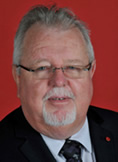
Senator Barry O’Sullivan
Image
source: Parliament of Australia
|
|
12 February
|
Ministerial statements: Closing the Gap
The Prime Minister, Tony
Abbott MP (Lib, Warringah, NSW), makes the Closing the Gap statement to
the House of Representatives. This annual statement provides an update
on progress towards the Closing the Gap targets, which seek to improve
outcomes for Aboriginal and Torres Strait Islander people across a range of
areas. In his statement, he says:
I
can report that our country is on track to achieve some of the Closing the
Gap targets. The target to halve the gap in child mortality within a decade
is on track to be met. We are already close to meeting the target to have 95
per cent of remote children enrolled for preschool ... The target to halve the
gap in year 12 attainment by 2020 is also on track to be met. That is the
good news.
The
bad news is that there has been almost no progress in closing the life
expectancy gap between Aboriginal and other Australians, which is still about
a decade. There has been very little improvement towards halving the gap in
reading, writing and numeracy. And Indigenous employment, I deeply regret to
say, has, if anything, slipped backwards over the past few years.[1]
|
|
|
13 February
|
100th Victoria Cross for Australia awarded
The Prime Minister, Tony
Abbott MP (Lib, Warringah, NSW), informs the House of Representatives
that the 100th Victoria Cross for Australia has been awarded posthumously to
the late Corporal Cameron Baird VC MG. Corporal Baird was killed during an
engagement with insurgents in southern Afghanistan in 2013, and was the 40th
Australian soldier to be killed in Afghanistan. His Victoria Cross citation
reads:
For most conspicuous acts of valour, extreme devotion to
duty and ultimate self-sacrifice at Ghawchak village, Uruzgan Province,
Afghanistan as a Commando Team Commander in Special Operations Task Group on
Operation SLIPPER.[2]
|
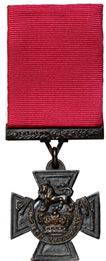
Victoria Cross MoD/MOD
Image
source: Wikimedia Commons
Watch: VC announcement—Corporal Cameron Baird VC MG
|
|
18 February
|
High Court declares void the WA half-Senate election
On 15 November 2013, following the loss of 1,370
ballots, the Australian Electoral Commission (AEC) lodges a
petition with the Court of Disputed Returns seeking an order that the
election of six senators in Western Australia be declared void. An inquiry
commissioned by the AEC and led by former Australian Federal Police
Commissioner Mick Keelty AO identifies significant and systemic
shortfalls and failings in Senate ballot paper security, storage and handling
in Western Australia.[3]
On 18 February 2014, the High Court, sitting as the Court
of Disputed Returns, declares void the 2013 half-Senate election in Western
Australia, the first time that this has occurred. It finds that:
the conclusion that the loss probably affected the result
of the election was inevitable. The number of ballot papers lost far exceeded
the margin between the candidates at the determinative point in the count.[4]
On 21 February, the Special Minister for State, Senator
Michael Ronaldson (Lib, Vic.), announces the resignations of the Electoral
Commissioner, Ed Killesteyn, and the Australian
Electoral Officer for Western Australia, Peter Kramer. Tom Rogers is appointed as
Electoral Commissioner on 15 December 2014, having acted in that position
since Killesteyn’s resignation.
|
|
|
27 February
|
House of Representatives ‘admonishes’ a senator
The Minister for Foreign Affairs, Julie
Bishop MP (Lib, Curtin, WA) expresses concern about remarks made by the
Shadow Minister for Defence, Senator
Stephen Conroy (ALP, Vic.) about Lieutenant General Angus Campbell during
a Senate Estimates hearing.[5]
The action has no effect as, while each House is able to discipline its own
members, it has no such powers over members of the other House.[6]
The Senate has determined by resolution that it ‘would not be proper for the
Senate to seek to censure a private member of the other House.’[7]
|
|
|
5 March
|
Censure motion against Assistant Minister for Health
The Senate votes in favour of a motion to censure the
Assistant Minister for Health, Senator
Fiona Nash (NP, NSW), for misleading the Senate over a conflict of
interest within her office, failing to comply with an order for production of
documents, or to account to the Senate for her actions. The censure
motion is passed 37 votes to 31. Censure motions are relatively rare in
the Senate. They express the view of a majority of the Senate and, although
they can have no direct constitutional or legal consequences, they may have a
political impact.[8]
|
|
|
19 March
|
Ministerial accountability: Assistant Treasurer stands
aside
Assistant Treasurer Senator
Arthur Sinodinos (Lib, NSW) stands aside[9]
after the Opposition suspends standing orders to move a motion
requiring him to provide a full explanation to the Senate about his interest
in Australian Water Holdings after allegations about the company were raised
in the NSW Independent Commission Against Corruption (ICAC).[10] He will formally resign
as Assistant Treasurer in December 2014 pending the outcome of the ICAC
inquiry.
|
|
|
28 March
|
New Governor-General sworn in
Peter Cosgrove is sworn-in as the 26th Governor-General of
the Commonwealth of Australia and is appointed Knight of the Order of
Australia.[11]
He replaces the 25th Governor-General, Quentin Bryce. She is the first woman
to hold the vice-regal position, and she is appointed Dame of the Order of
Australia (AD) on 25 March 2014.[12]
|
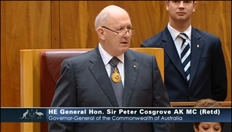
Governor-General Peter Cosgrove
Image
source: ParlView,
28 March 2014
Watch: Governor-General swearing-in ceremony, 28 March 2014
Read: Address to the Joint Sitting of Parliament on the
occasion of the swearing in of the Governor-General
|
|
28 March
|
Motion of no confidence in the Speaker
The Manager of Opposition Business, Tony
Burke MP (ALP, Watson, NSW), moves a motion
of no confidence against the Speaker of the House of Representatives, Bronwyn
Bishop MP (Lib, Mackellar, NSW), accusing her of partiality in favour of
Government members rather than acting as ‘the custodian of the rights and
privileges of elected Members of the Parliament’.[13]
The motion is unsuccessful, 83 votes to 51.
According to House of Representatives Practice, the
Speaker’s actions can only be criticised by a substantive motion, including
dissent from a Speaker’s ruling or a censure or want of confidence motion.
Whilst they are rare, there have been several substantive motions criticising
the actions of a Speaker in the history of the Parliament.[14]
|
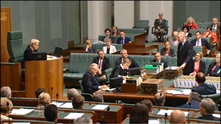
Motion of no confidence in the Speaker
Image
source: ParlView, 28 March 2014
|
|
5 April
|
Western Australian Senate election
Western Australians go to the polls to elect six senators
in the 2014 WA Senate election. This new election is conducted following the
discovery of missing ballots during the 2013 WA Senate election and the
decision of the High Court, sitting as the Court of Disputed Returns,
to declare the 2013 Western Australian Senate election void. Two days before
the election, the AEC admits
failing to properly secure 75 ballot papers at a mobile pre-polling booth
at an aged care facility.
The results
are announced by the AEC on 29 April 2014.[15]
The composition of the new Senate sets a record, with 18 senators on the
crossbench including 10 senators representing the Australian Greens.
As a result of the 2013 Senate election issue, questions
are raised about the need for electoral reform. The AEC commences an overhaul
of its policies and processes in December 2013, focusing on improving ballot
paper security.[16]
In May 2014 the Australian
National Audit Office undertakes an independent performance audit in the
AEC, while the Joint
Standing Committee on Electoral Matters (JSCEM) undertakes an inquiry
into the election (the final report is released in April 2015).[17]
|
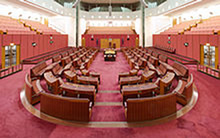
Senate
chamber, Parliament House
|
|
24 April
|
Royal reception
His Royal Highness the Duke of Cambridge and Catherine,
Duchess of Cambridge, attend a Reception in the Great Hall at Parliament
House during their Australian tour. His Royal Highness gives a speech
reflecting on Australia’s qualities and role in the Asia-Pacific region.[18]
|
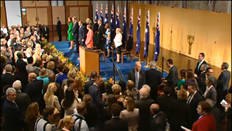
Reception for the Duke and Duchess of
Cambridge, Parliament House
Image
source: ParlView, 24 April 2014
Watch: Parliamentary reception in the presence of their
Royal Highnesses the Duke and Duchess of Cambridge
Watch: Speech to the Parliament by His Royal Highness the
Duke of Cambridge, 24 April 2014
|
|
13 May
|
Treasurer’s 2014 Budget speech
The Treasurer, Joe
Hockey MP (Lib, North Sydney, NSW) introduces the 2014 Budget into
Parliament. It is the first Budget of the Coalition Government.[19]
Budget Day is the busiest day of the year for Parliament House, with almost
11,000 people visiting the building.[20]
The Budget proves to be controversial, particularly in regard to unlegislated
savings measures.[21]
|

Joe Hockey
Image
source: Parliament of Australia
Read: The Treasurer’s Budget speech and Budget papers
|
|
26 May
|
‘Pipe bomb’ produced at Senate Estimates hearing
Senator
Bill Heffernan (Lib, NSW) produces a fake ‘pipe bomb’ at a Senate
Estimates hearing of the Legal and Constitutional Affairs Legislation
Committee in order to support his argument that ‘[t]his building is no longer
secure’ because of new security arrangements introduced by the Department of
Parliamentary Services.[22]
The new arrangements, introduced on 19 May 2014, were initially to be
trialled over a twelve-month period. However, full screening is reinstated on
2 July 2014, in preparation for the visit by Japanese Prime Minister
Shinzo Abe, and remains in place thereafter.[23]
|
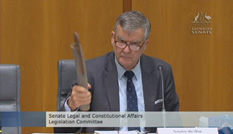
Bill Heffernan with fake ‘pipe bomb’
Image
source: ParlView,
26 May 2014
|
|
27 May
|
Pacific nations call on Parliament to act on climate
change
A delegation from the Pacific Island nations of Kiribati,
Tuvalu and Papua New Guinea perform a song on the lawns of Parliament House,
urging Australia's parliamentarians to take urgent action on climate change.
The delegation seeks cuts in carbon emissions and assistance to mitigate the
impact of climate change on their countries.
|
|
|
8 June
|
The Federation Chamber turns 20
The Federation Chamber of the House of Representatives
celebrates its twentieth anniversary.[24]
The Federation Chamber (known as the Main Committee prior to 2012) is a
debating committee established as an alternative venue to the Chamber of the
House. It operates in parallel with the Chamber in order to allow two streams
of business to be debated concurrently.[25]
The number of bills before the House had increased
steadily since Federation, resulting in less time for detailed consideration
of each bill. In the first decade of Federation, for example, the House had
sat for 25 hours for each Act passed. This had been reduced to just two hours
per Act by 1992. In addition, in 1986 the Senate had introduced deadlines for
the receipt of bills from the House. In response, the House increased the
number of bills declared urgent by using the procedure known as the
‘guillotine’ in order to speed up the process, resulting in fewer
opportunities for members to contribute to debate on a bill.[26]
In 1986 the Procedure Committee (34th Parliament) recommended the use of
legislation committees but, in 1993, the Procedure Committee (37th
Parliament) rejected this recommendation on the basis that legislation
committees did not appear to save the House time. As a result the ‘committee
of the whole’ stage of bill consideration was abolished and the House agreed
to several reforms including the Main Committee to act as a second chamber.
The Main Committee met for the first time on 8 June 1994.[27]
On 22 June 2015, the House of Representatives Standing Committee on Procedure
report ‘Role
of the Federation Chamber: Celebrating 20 years of operation’ becomes the
first report to be tabled in the Federation Chamber.[28]
|
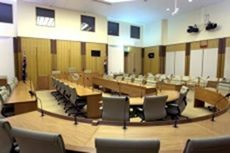
Federation Chamber, Parliament House
|
|
18 June
|
A matter of privilege: the use of CCTV footage
On joint
motion of Senators Cory
Bernardi (Lib, SA) and John
Faulkner (ALP, NSW), the Senate refers to the Committee of Privileges the
Department of Parliamentary Service’s use of CCTV footage in an internal
disciplinary matter. The Committee’s Terms of Reference are to inquire as to:
whether there was any improper (actual or attempted) interference with a
senator in the free performance of his duties; and whether disciplinary
action was taken against any person in connection with the provision of
information to a senator.[29]
The Privileges Committee tables
its report on 5 December 2015.
|
|
|
26 June
|
Inquiry into Department of Parliamentary Services
The Senate Standing Committee on Finance and Public
Administration receives a reference to conduct an inquiry into the
performance of the Department of Parliamentary Services (DPS). The Terms
of Reference include progress in implementing the Committee’s 2012
reports into the performance of DPS with regard to workplace culture and
employment issues, heritage, building and asset management issues, and
contract management. The inquiry is completed in September 2015.[30]
|
|
|
1 July
|
New senators commence
Twelve new senators commence their terms on 1 July 2014
following the 2013 federal election and the 2014 WA Senate election.[31]
In May 2014, the Electoral Matters Committee had tabled an
interim
report on the conduct of the 2013 election recommending that the Senate
electoral system be changed to remove Group Voting Tickets and introduce
optional preferential voting above and below the line.[32]
|

Senate chamber,
Parliament House
|
|
2 July
|
Senate meets to fill vacancy
The Senate meets on 2 July in order to appoint Senator
Deborah O’Neill (ALP, NSW) to fill a vacancy left by the resignation of
former senator Bob
Carr in October 2013. Senator Carr had submitted a double resignation —
that is, from both his current term and from the term to which he had been
elected (to commence from 1 July 2014). A full explanation of the process is
outlined in the Senate’s Procedural
Information Bulletin No 284.[33]
|
|
|
7 July
|
New President of the Senate
Senator
Stephen Parry (Lib, Tas.) becomes the 24th President of the Senate. In
his address
to the chamber Senator Parry says:
I truly appreciate the honour that each of you has bestowed
upon me. It is something that I do not take lightly ... I intend to defend the
parliament as being truly independent, especially independent from the
executive government. I think that is an important aspect about every
Presiding Officer. The executive government has a right to govern, and we
must respect that, but, equally, the parliament itself should be independent
from the executive.[34]
|
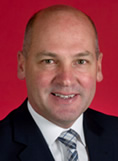
Senator Stephen Parry, President of the Senate
Image source: Parliament of Australia
|
|
7 July
|
New Senate sworn in
The new Senate is sworn in by the Governor-General, Peter
Cosgrove). The new Senate includes 14 new senators[35]
and comprises:
- 33 Coalition senators
- 25 Australian Labor Party senators
- 10 Greens senators
- 8 senators from smaller parties.[36]
|
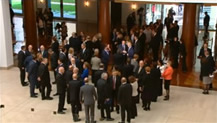
Image source: ParlView, 7 July 2014
Watch: Swearing-in of new senators and Morning Tea in
Members’ Hall
|
|
8 July
|
Address by the Prime Minister of Japan
During his visit to Australia the Prime Minister of Japan,
Shinzo Abe, gives an address
to members and senators in the House of Representatives.[37]
|
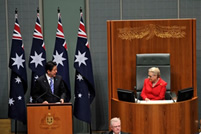
Prime Minister of Japan Shinzo Abe
addressing the Parliament
Image source: Auspic
Watch: Address to the Parliament by Shinzo Abe, 8 July 2014
Read: Address to the Parliament by Shinzo Abe, 8 July 2014
|
|
16 July
|
Visitor celebrates 100th birthday at APH
During Question Time the Speaker, Bronwyn Bishop MP,
acknowledges Beryl
James from Cairns, stating that ‘(i)t was her wish that she celebrate her
100th birthday in the Australian Parliament’.[38]
|
|
|
19-22 July
|
Malaysian Airlines MH17 tragedy
Prime Minister Tony Abbott MP announces that the
Australian National Flag will be flown at half-mast on all Australian
Government establishments in Australia and overseas, including Parliament
House, as a mark of respect to the Australians who lost their lives on
Malaysia Airlines Flight 17.[39]
The scheduled international passenger flight from Amsterdam to Kuala Lumpur
crashed on 17 July 2014 after being shot down, killing all 283 passengers and
15 crew on board, including 38 Australians.
On 22 July 2014 a ceremony takes place in the Marble Hall
of Parliament House for the official signing of the Condolence Book in
support and sympathy for those tragically killed on Flight MH17.[40]
A National Day of Mourning and National Memorial Service for the victims are
planned for 7 August 2014.
|
Watch: Signing of the official Condolence Book in support
and sympathy for those tragically killed on Flight MH17
|
|
26 August
|
Condolence motion for Ukraine air disaster
Prime Minister Tony Abbott MP moves a condolence
motion expressing the House of Representative’s ‘outrage and condemnation
at the downing of Malaysia Airlines Flight MH17 over Eastern Ukraine on 18
July’, and extending the House’s sympathy to the families, friends and loved
ones of those who perished in the disaster.[41]
The Leader of the Opposition, Bill
Shorten MP (ALP, Maribyrnong, Vic.), makes a statement in support of the
condolence motion, describing the events as ‘a global tragedy which has
struck at Australian hearts.’[42]
|
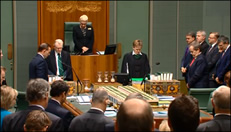
Condolence motion in the House of
Representatives for the Ukraine air disaster
Image source: ParlView,
26 August 2014
|
|
1 September
|
Parliamentary approval for troop deployments
Senator
Christine Milne (AG, Tas.), Leader of the Australian Greens, moves a motion
relating to parliamentary approval for the deployment of Australian troops in
Iraq. When leave is not granted, Senator Milne seeks
unsuccessfully to suspend standing orders to enable such a motion to be
moved and debated. In Australia, the power to declare war and deploy troops
remains the prerogative of the Executive.[43]
The Senate later that day debates
a ministerial statement on Iraq.[44]
|
|
|
3 September
|
Australian National Flag Day
A flag raising ceremony takes place in the Forecourt of
Parliament House to mark the occasion of Australian
National Flag Day. The day celebrates the first time the flag was flown,
on 3 September 1901.
|
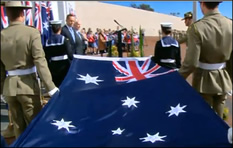
Image source: ParlView,
3 September 2014
Watch: Flag raising ceremony
|
|
4 September
|
Parliament’s role in overseas military activity
The Leader of the Australian Greens, Senator Christine
Milne, asks the Senate to pass a private senator’s bill—Defence
Legislation Amendment (Parliamentary Approval of Overseas Service) Bill 2014—to
insert a new section into the Defence Act 1903 requiring decisions to
deploy members of the Australian Defence Force overseas to be debated and
voted on by the Parliament. The attempt is defeated 54 votes to 12.[45]
The bill is introduced in the context of Australia’s involvement in the
Middle East conflict, and follows previous attempts since 1985 by the
Australian Democrats, and more recently by the Australian Greens, to remove
the exclusive power of the government to commit Australia to war.
Since 1901 successive Australian governments have adopted
the convention that the government of the day, rather than the Parliament,
has the ultimate responsibility for making decisions involving Australia’s
overseas military activity. The Constitution does not expressly say who is
responsible for declaring war or deploying troops.[46]
Whilst the Parliament could legislate (under the defence power in section 51(vi)
of the Constitution) to ensure that all major decisions regarding Australia’s
commitment to war are first approved by the Parliament, this has not been
done in the history of the Parliament.[47]
|
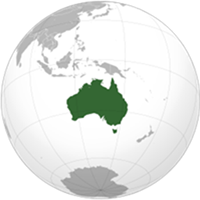
Image source: Ssolbergj/Wikimedia Commons
|
|
4 September
|
Senator resigns from Democratic Labour Party
Senator
John Madigan (Ind, Vic.) informs the Senate that he has resigned from the
Democratic Labour Party and will continue his term as an independent senator.
His decision changes the composition of the Senate, with the number of
independents rising to two.[48]
|
|
|
7 September
|
Death of Harry Evans
Harry Evans, the longest serving Clerk of the Australian
Senate, dies. Evans served as Clerk from 1988 to 2009,[49]
and was editor of the 7th to 12th editions of Odgers’ Australian Senate
Practice.
On 9 September, the Clerk of the Senate, Dr Rosemary
Laing, releases a statement paying tribute to Mr Evans. She says:
Harry was known – notorious even in some
circles – as a defender of the Senate and the rights of individual senators
as he worked tirelessly to assist them to perform their constitutional
duties. He was fearless in emphasising the necessary distinction between the
parliament and the executive, even though that made him unpopular with
various governments over the years.[50]
|

Former Clerk of the Senate, Harry
Evans
Image source:
Brian Jenkins/Wikimedia Commons
|
|
21 September
|
Increased security at Parliament House
Following an urgent review of the safety of Parliament
House, the Australian Federal Police (AFP) assumes responsibility for
internal and external security for Australian Parliament House amid heightened
security concerns. According to the Prime Minister, Tony Abbott MP:
In this building, there will be more armed police, fewer
points of access, and more scrutiny of parliamentary passes.[51]
The move to increase security measures follows the raising
of the National Terrorism Public Alert from medium to high on 12 September,
the first time the threat has been raised since the system was introduced in
2003.[52]
|
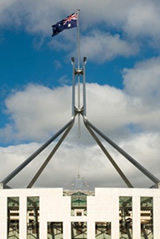
Parliament House
Image source: Phillip Minnis/Shutterstock.com
|
|
22 September
|
National security
Prime Minister Tony Abbott MP updates the House of
Representatives on challenges to Australia’s national security. He
acknowledges the Opposition’s bipartisan support for ensuring the safety of
all Australians and outlines three key messages:
- that the Government will do whatever is possible to keep people
safe
- that Australia’s security measures at home and abroad are
directed against terrorism, not religion, and
- Australians should live normally because the terrorists’ goal
is ‘to scare us out of being ourselves’.[53]
The Leader
of the Opposition, Bill Shorten MP, makes a statement in reply.[54]
|
|
|
24 September
|
Counter-terrorism Bill introduced
The Attorney-General Senator
George Brandis (Lib, Qld) introduces the Counter-Terrorism
Legislation Amendment (Foreign Fighters) Bill 2014 to the Senate.[55]
The Bill seeks to respond to the threat posed by Australians engaging in, and
returning from, conflicts in foreign states, including by implementing
recommendations made in a recent review of Australia’s counter-terrorism
laws. The Bill, incorporating amendments recommended by the bipartisan
Parliamentary Joint Committee on Intelligence and Security (PJCIS), is passed
by the Senate on 29 October and the House on 30 October.[56]
|

Image source: Ken Hodge/Wikimedia
Commons
|
|
24 September
|
Recommendations on use of electronic devices
The House of Representatives Standing Committee on
Procedure finalises its report on the Use
of electronic devices in the Chamber and Federation Chamber. This
inquiry was generated by a concern from members regarding the appropriate use
of electronic devices in the Chamber and Federation Chamber—what rules apply
and what guidance might assist members to be aware of and understand their
responsibilities. The report recommends that:
- the current ‘Guidelines for members on the status and handling
of their records and correspondence’ be updated to include communications by
members via electronic devices, and
-
the House consider and adopt a resolution that clarifies how
electronic devices are to be used in the Chamber.[57]
A motion on
electronic devices in the Chamber is passed by the House of Representatives
on 26 March 2015, allowing their use subject to certain conditions.[58]
|

Image source: maradonna 8888/Shutterstock.com
|
|
30 September
|
Guest lecture by Speaker of the House of Commons
The Speaker of the House of Commons, John Bercow MP,
addresses some of the challenges faced by modern parliaments and representatives
across the Commonwealth, in the era of the digital revolution and
‘disruptive’ technology.[59]
|
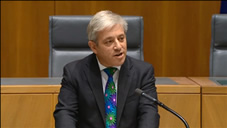
John Bercow MP, Speaker of the House of
Commons
Image
source: ParlView,
30 September 2014
Watch: The Speaker of the House of Commons presenting a Guest of Parliament lecture
|
|
30 September
|
Select Committee on Queensland Government
The Senate resolves to establish a Select Committee on
Certain Aspects of Queensland Government Administration related to
Commonwealth Government Affairs to be chaired by Senator
Glenn Lazarus (PUP, Qld). It commences hearings on 13 November 2014. The Terms
of Reference include the Queensland Government’s administration of
Commonwealth funds allocated to Queensland since 2012, judicial independence
and separation of powers in the Queensland courts and judicial system, the
approval process for development of projects for export of resources and
services and the Commonwealth Government’s oversight of approvals for coal
seam gas projects in Queensland.[60]
The Committee tables its report
in March 2015.
|
|
|
2 October
|
Presiding Officers’ decision on covered visitors to
Parliament House
In the context of heightened national security concerns
the President of the Senate, Senator Stephen Parry and the Speaker, Bronwyn
Bishop MP introduce interim
security measures to ban face-coverings from being worn in the building.
Under the interim measures, people who enter the building
‘covering themselves in such a way they cannot be clearly identified’,[61]
will be asked to be identified and to produce identification. They will then
be free to move around the building but will be required to sit in the
glassed enclosures in order to view parliamentary proceedings. On 20 October
the Presiding Officers issue a further ruling that people with face coverings
be visually identified upon entry to Parliament House, ‘thereby enabling
persons with facial coverings to move from that point freely into the public
portions of the building, including the chamber galleries’.[62]
|
|
|
21 October
|
Former Prime Minister Gough Whitlam dies
Former Australian Prime Minister Gough Whitlam (ALP,
Werriwa, NSW) dies aged 98 years. Mr Whitlam served as Australia’s 21st Prime
Minister before being dismissed from office by Governor-General Sir John Kerr
on 11 November 1975. His contribution to Australia is marked in condolence
motions led by the Prime
Minister, Tony Abbott MP and Leader
of the Opposition, Bill Shorten MP. The Prime Minister states that:
In every sense, Gough Whitlam was a
giant figure in this parliament and in our public life. He was only Prime
Minister for three years—three tumultuous years—but those years changed our
nation and, in one way or another, set the tone for so much that has
followed. Whether you were for him or against him, it was his vision that
drove our politics then and which still echoes through our public life four
decades on.[63]
A NSW state memorial service is held at the Sydney Town
Hall on 5 November.
|
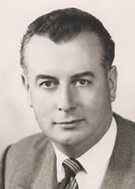
Gough Whitlam (1955)
Image source: Wikimedia
Commons
Watch: Condolence motions from the Prime Minister, Tony Abbott MP and the Leader of the Opposition, Bill Shorten MP
|
|
22 October
|
National Week of Deaf People
Julie
Owens MP (ALP, Parramatta, NSW) gives a speech to the House of
Representatives acknowledging the 2014 National
Week of Deaf People. She simultaneously delivers her speech in Auslan
(sign language).[64]
Note: The Department of Parliamentary Services noted in
response to a Question on Notice at a Senate
Estimates hearing in July 2014 that it was assessing whether live
broadcasts of parliamentary proceedings could be captioned.
Live captioning of parliamentary proceedings begins with
the commencement of the 45th Parliament, initially for five hours per day for
each chamber, with the goal of having all parliamentary video recordings
live-captioned by mid-2018.[65]
|
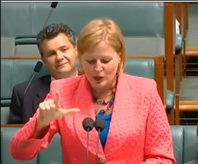
Julie Owens MP delivering her speech in Auslan
Image source: ParlView,
22 October 2014
Watch: Julie Owens MP making a speech to Parliament in Auslan
|
|
23 October
|
Terrorist attack on Canadian Parliament
Prime Minister Tony Abbott MP, and Leader of the
Opposition Bill Shorten MP express their condolences at the loss of life and
injury sustained during a terrorist attack on the Canadian Parliament and the
Canadian National War Memorial on the previous day. The Prime
Minister states that:
So an attack on their parliament is an affront to this
parliament too. So today we stand shoulder to shoulder with our Canadian
comrades in defiance and resolution.[66]
The Speaker, Bronwyn Bishop MP asks the Canadian High
Commissioner, Michael Smith, who is present in the House of Representatives
chamber, to convey the Australian Parliament’s sentiments and support to the
Canadian Parliament.
|
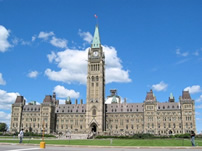
Canadian Parliament Buildings, Ottawa
Image source: Steven W
Dengler/Creative Commons
|
|
23 October
|
Statement by Speaker regarding Parliament House
security
The Speaker, Bronwyn Bishop MP makes a statement
to the House of Representatives concerning security arrangements around
Parliament House in view of the terrorist attack on the Canadian Parliament
on 22 October. She notes that the design of the Australian Parliament is very
different to that of the Canadian Parliament, and that there are ‘layers of
security measures’ in place that would prevent such an attack from succeeding
here.[67]
|

Parliament House forecourt
|
|
14 November
|
Address by the Prime Minister of the United Kingdom
David Cameron, Prime Minister of the United Kingdom, gives
an address
to members and senators in the House of Representatives chamber.[68]
|
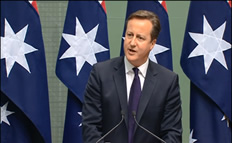
Prime Minister of the United Kingdom David
Cameron addressing the Parliament
Image
source: ParlView, 14 November 2014
Watch: Address by David Cameron, MP, Prime Minister of the
United Kingdom
|
|
17 November
|
Address by the President of the People’s Republic of
China
Xi Jinping, President of the People’s Republic of China,
gives a speech
at a dinner held in the Great Hall of Parliament House.[69]
|
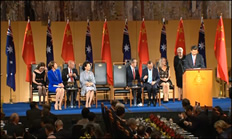
Address by President of the People’s Republic
of China Xi Jinping
Image
source: ParlView,
17 November 2014
Watch: Speech by Xi Jinping, President of the People’s
Republic of China
|
|
18 November
|
Address by the Prime Minister of the Republic of India
Narendra Modi, Prime Minister of the Republic of India,
gives an address
to members and senators in the House of Representatives chamber.[70]
|
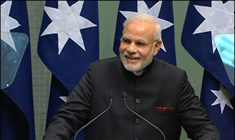
Prime Minister of India Narendra Modi
addressing the Parliament
Image
source: ParlView,
18 November 2014
Watch: Address by Narendra Modi, Prime Minister of the
Republic of India
|
|
19 November
|
State visit by the President of the French Republic
François Hollande, President of the French Republic, visits
Parliament House during his State Visit to Australia, which coincides
with the meeting of world leaders attending the G20 Summit in Canberra.[71]
|
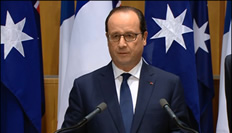
President of France François Hollande at joint media conference
Image source: ParlView, 19 November 2014
Watch: State visit to Australia by François Hollande,
President of the French Republic, joint media conference with the Prime
Minister Tony Abbott MP
|
|
24 November
|
Senator resigns from Palmer United Party
Senator
Jacqui Lambie (Ind, Tas.) informs the Senate that she has resigned from
the Palmer United Party and that she will to continue her term as an independent
senator.[72]
Her decision again changes the composition of the Senate, with the number of
independents rising to three.[73]
|

Senator Jacqui Lambie
Image source: Parliament of Australia
|
|
26 November
|
Censure motion against Minister for Defence
The Senate votes in favour of a motion to censure the
Minister for Defence, Senator
David Johnston (Lib, WA) over his comment on 25 November that he would
not trust the Government’s shipbuilder, the Australian Submarine Corporation,
to ‘build a canoe’. The censure
motion is passed by 37 votes to 31.[74]
|
|
|
26 November
|
Security Management Board for Parliament House
The Speaker, Bronwyn Bishop, MP introduces the
Parliamentary Service Amendment Bill 2014 into the House. The Bill amends the
composition of the Security Management Board include the Australian Federal
Police. In introducing the Bill, the Speaker states that:
... the security arrangements in the
parliamentary precincts are under continual and careful assessment, and I am
working closely with a range of departments including security and
intelligence agencies, in carrying out the necessary security works within
the parliamentary precinct.[75]
During the Bill’s second reading in the Senate, the
President notes that the authority to make decisions regarding security for
Parliament House remains vested in the Presiding Officers.[76]
The Bill passes both Houses on 26 March 2015.
|
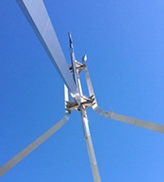
Parliament House flagpole
|
|
4 December
|
Labor MP ejected from House of Representatives
The Speaker ejects Nick
Champion MP (ALP, Wakefield, SA) from the House of Representatives for
disorderly behaviour after taking a bunch of bananas into Question Time to
illustrate his point that by closing car manufacturing in Australia ‘[t]his
government has gone completely bananas.’ The Speaker Bronwyn Bishop MP says:
‘The Member for Wakefield and his bananas will leave under 94(a).’[77]
|
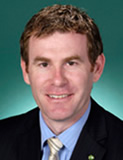
Nick Champion MP
Image source: Parliament of Australia
Read: R Lundie, ‘That’s it, you’re out’: disorderly conduct in
the House of Representatives from 1901 to 2013, Research Paper Series, 2013 ̶ 14,
Parliamentary Library, 11 December 2013
|
2015
|
Milestones
|
Details
|
|
|
6 February
|
Resignation of Senator John Faulkner
Senator John Faulkner resigns, creating a casual
vacancy in the Senate.[78]
Senator Faulkner served
as a senator for 25 years, including as a Minister.[79]
The President of the Senate, Senator Stephen Parry, informs the Senate of the
vacancy on 9 February.[80]
|
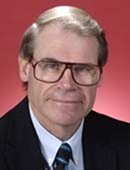
John Faulkner
Image source: Parliament of Australia
|
|
9 February
|
Martin Place siege remembered
The House
of Representatives passes a motion, moved by the Prime Minister,
acknowledging the courage of those held during the siege of the Lindt Café in
Martin Place, Sydney, in December 2014, and extending the sympathies of the
House to the family and friends of Katrina Dawson and Tori Johnson, who were
killed in the siege.[81]
The families of Ms Dawson and Mr Johnson, along with survivors of the siege,
are present to hear the speeches. The Senate also expresses its sympathy to
the victims and their families.[82]
|
|
|
10 February
|
Enhanced security arrangements at Parliament House
The Speaker, Bronwyn Bishop MP, announces that, as part of
the continuing upgrade to security at Parliament House, she has agreed to an
armed Australian Federal Police (AFP) presence in the attendants’ booth
adjacent to the chamber.[83]
|
|
|
11 February
|
Ministerial statements—Closing the Gap
The Prime Minister, Tony Abbott MP, advises the house of
progress toward the Closing the Gap targets since his 2014 Closing the Gap
statement. The Prime Minister notes that:
Last year ... I said that our challenge was to turn
good intentions into better outcomes ... There are some improvements in
education and health outcomes ... However, the other targets—to close the gap
in life expectancy within a generation; to ensure access to early childhood
education for all Aboriginal and Torres Strait Islander students; and to
halve the gaps in employment outcomes—have either not been met or are not on
track to be met. [84]
Opposition Leader Bill Shorten MP says:
A great nation includes everyone, and a good society
leaves no-one behind, but this report confronts us with two nations—two
Australias.[85]
|
|
|
12 February
|
Andrew Chan and Myuran Sukumaran: the Parliament calls
for sentence commutation
The House
of Representatives and the Senate
pass cross-party motions calling on the Indonesian government to ‘give
consideration to the circumstances of Mr Chan and Mr Sukumaran and their
rehabilitation in prison, their suffering and that of their families, and
commute their sentences to an appropriate term of imprisonment.’[86]
Speaking to the motion in the House, the Minister for Foreign Affairs, Julie
Bishop MP states:
this
motion goes to the heart of what we believe will be a grave injustice against
two Australian citizens facing execution in Indonesia. Whatever one's views
of the rights and wrongs of this situation, after speaking to the mothers of
Australian citizens Andrew Chan and Myuran Sukumaran I ask others to place
themselves just for a moment in the shoes of these young men and their
families—sons, brothers—facing death by firing squad for shocking actions, for
shocking mistakes made over a decade ago.
Australia's
strong opposition to the death penalty at home and abroad is reflected in the
government's determination to do all possible to seek a stay of execution and
clemency for Andrew and Myuran. At the same time ..., we acknowledge the very
serious drug‑smuggling crimes for which Andrew and Myuran were
convicted.[87]
In the Federation Chamber Sarah Henderson MP (Lib, Corangamite,
Vic), speaking, in Bahasa Indonesia, appeals to President Joko Widodo to
‘please give mercy’.[88]
Some 100 senators and members also sign a
letter to the Indonesian Ambassador requesting that the sentences be
commuted.[89] On 5 March, around 40 parliamentarians join a candlelight vigil
in the Parliament House forecourt, organised by the Australian
Parliamentarians against the Death Penalty (convened by Philip Ruddock MP (Lib, Berowra, NSW)
and Chris Hayes MP (ALP, Fowler, NSW).
Despite concerted diplomatic
representations, a public campaign, and the pleas of friends and family, the
two men are executed with six other prisoners on 29 April 2015.
In Australia, the death penalty for crimes
under federal and territory laws was abolished in 1973 by the Death
Penalty Abolition Act; this was extended to
state laws in 2010 with the Commonwealth Crimes
Legislation Amendment (Torture Prohibition and Death Penalty Abolition) Act
2010.[90] The last person to be judicially executed for a crime in Australia
was Ronald Ryan, in 1967.[91]
In June 2015, the Member for Fairfax (Qld), Clive Palmer MP (PUP), introduces
into the House the Foreign Death Penalty Offences (Preventing Information Disclosure)
Bill 2015. The purpose of this private member’s
bill is to prevent the disclosure of information by public officials in
circumstances that may lead to the imposition of the death penalty in foreign
countries. The Bill is removed from the Notice Paper on 20
October.[92]
|
|
|
18 February
|
New guidelines for official witnesses appearing at
parliamentary committees
Revised Government guidelines for official witnesses before Parliamentary
Committees and related matters are tabled out of
sitting. The Guidelines, developed by the Department of the Prime
Minister and Cabinet, are ‘designed to assist departmental and agency
officials, statutory office holders and the staff of statutory authorities in
their dealings with the parliament’.[93] The revised Guidelines are long-awaited, having not been
updated since 1989.
|
|
|
23 February
|
State visit by the King and Queen of Norway
Their Majesties King Harald V and Queen
Sonja of Norway attend an official dinner at Parliament
House as part of their official visit to Australia (22 to 27 February 2015).
They are accompanied by a delegation of senior government and business
leaders.
|
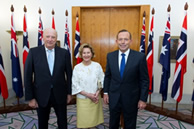
Their Majesties King Harald V and Queen Sonja of Norway
with Prime Minister Tony Abbott MP at Parliament House
Image source:
Auspic
|
|
23 February
|
Parliament celebrates the release of journalist Peter
Greste
On 2 February, Australian journalist Peter Greste was
freed from an Egyptian prison where he had been held for over 400 days. Mr
Greste had been sentenced to seven years in jail on charges that included
aiding a terrorist group in a case that sparked international condemnation.[94] A motion
in the House of Representatives, moved by Jane
Prentice MP (Lib, Petrie, Qld):
...
commends the Greste family on its courage, resilience and grace for
more than 400 days; and ...
notes
that ‘Telling the truth is not terrorism and journalism is not a
crime’.[95]
|
|
|
23 February
|
Hansard controversy
During Senate Estimates, the Department of Agriculture is
questioned over a Freedom of Information request relating to possible
interference with the Hansard record. The Hansard in question relates to a
response by the Minister for Agriculture, Barnaby Joyce MP to a question on
notice.[96]
The issue is also canvassed at a further Estimates hearing on 5 March.[97]
The head of the Department of Agriculture,
Dr Paul Grimes PSM, steps down in March 2015, amid reports
that his relationship with the Minister has broken down over the issue.[98]
In October 2016, a letter
from Dr Grimes to Mr Joyce dated 2 March 2015 is released, following a
lengthy legal battle to prevent its release.[99]
|
|
|
2 March 2016
|
Report into the use of CCTV material in Parliament
House
The President of the Senate, Senator Stephen Parry, tables
a report by the Senate Standing Committee on Privileges concerning the use of
closed circuit television (CCTV) material within Parliament House.[100]
The report examines (among other things) the use of CCTV footage by the
Department of Parliamentary Services (DPS) for internal investigations
involving DPS staff and ‘whether there was any improper interference, or
attempted improper interference, with the free performance by Senator
Faulkner or any other senator of their duties as a senator’.[101]
|
|
|
3 March
|
Censure of the Attorney-General
Having suspended standing orders, the Senate debates an Opposition
motion to censure the Attorney-General, Senator George Brandis, for his
conduct towards the President of the Australian Human Rights Commission, Gillian
Triggs, including failing to defend her from ‘malicious attack’ and
seeking to obtain her resignation.[102]
These issues were also canvassed at length during the
Australian Human Rights Commission’s appearance before the Legal and
Constitutional Affairs Legislation Committee in the February estimates
hearings.[103]
The motion is carried 35 votes to 32.[104]A similar
censure motion in the House of Representatives on 25 February 2015 was
unsuccessful.[105]
|
|
|
3 March
|
Parliament’s role in overseas military activity
The Leader of the Australian Greens, Senator Christine
Milne, unsuccessfully seeks to suspend standing orders to enable the Senate
to debate a motion
about the deployment of Australian forces to Iraq.[106] On 4 March, Senator
Scott Ludlam (AG, WA) reintroduces a bill seeking to give the Parliament
authority for approving troop deployments, the Defence
Legislation Amendment (Parliamentary Approval of Overseas Service) Bill 2015,
noting that ‘this is the 30th year that this bill has been on the Notice
Paper in one form or another.’[107]
These moves follow a Ministerial Statement on the Middle East by the Minister
for Defence, Kevin
Andrews MP (Lib, Menzies, Vic) on 26 February 2015.[108]
In September, the Australian Greens also unsuccessfully
seek to suspend standing orders for a debate on a motion related to
parliamentary approval of the involvement of Australian forces in Syria.[109] While
the issue is debated in the Senate the following day, time for the debate
expires without a vote.[110]
|
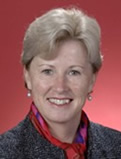
Christine Milne
Image source: Parliament of Australia
|
|
5 March
|
Senator Muir’s first speech
Senator
Ricky Muir (Australian Motoring Enthusiast Party, Vic.) delivers his
‘first speech’, the last of the cohort of senators elected in 2013 to do so.
He tells the Senate: ‘it may have taken eight months and four days, but
finally I am standing here in the great chamber presenting my first speech’.[111]
Senator Muir has, however, already spoken in debates and Question Time.
|

Ricky Muir
Image source: Parliament
of Australia
|
|
5 March
|
Intergenerational Report
The Treasurer, Joe Hockey MP, makes a ministerial
statement on the 2015
Intergenerational Report, describing it as ‘an
incredibly important document to start a serious conversation about the
challenges and opportunities ahead for Australia’.[112] Speaking in response, the Shadow Treasurer Chris Bowen MP (ALP, McMahon, NSW) is
sharply critical of the report, describing it as ‘fundamentally flawed’.[113] The Charter of Budget Honesty Act 1998
(Cth) requires the Australian Government to produce an Intergenerational
Report at least every five years which is to ‘assess the long term
sustainability of current Government policies over the 40 years following the
release of the report, including by taking account of the financial
implications of demographic change.’[114]
|
Read: the Intergenerational Report speeches by Mr Hockey and Mr Bowen
|
|
5 March
|
Aboriginal and Torres Strait Islander Peoples
Recognition Act 2013 extended
The Aboriginal
and Torres Strait Islander Peoples Recognition (Sunset Extension) Bill
passes both houses. The Bill amends the Aboriginal and
Torres Strait Islander Peoples Recognition Act 2013 (Cwth) (Act of
Recognition) to ensure that it continues to operate until a referendum to
recognise Aboriginal and Torres Strait Islander Peoples in the Constitution
can be held.[115]
|
|
|
13 March
|
Another senator resigns from the Palmer United Party
Senator Glenn Lazarus (Ind, Qld) announces
his resignation from the Palmer United Party and his decision to continue
his term as an independent senator. He confirms this decision in a short
statement in the Senate a few days later.[116]
His resignation changes the composition of the Senate again, with the number
of independents rising to four (of 18 crossbench senators).[117]
|

Glenn
Lazarus
Image source: Parliament of Australia
Watch: Senator Lazarus’ statement to the Senate
|
|
18 March
|
Visit by the Prime Minister of the
Socialist Republic of Vietnam
Mr Nguyen Tan Dung, Prime Minister of the
Socialist Republic of Vietnam, visits Parliament House during his State Visit
to Australia (16-18 March). During his visit, the two Prime Ministers sign
the Australia-Vietnam Enhanced Comprehensive Partnership and the two countries establish a Memorandum of Understanding establishing a youth exchange program.
|
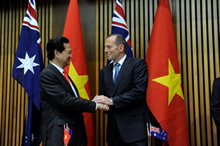
Prime Minister of Vietnam Nguyen Tan Dung with Prime Minister Tony Abbott MP
Image source: Auspic
Watch: His
Excellency Mr Nguyen Tan Dung, PM of the Socialist Republic of Vietnam arrive at Parliament House; and
The signing of the Australia-Vietnam
Enhanced Comprehensive Partnership
Read: the Prime Ministers’ Joint Statement on the
Comprehensive Partnership
The Declaration on Enhancing the
Australia-Vietnam Comprehensive Partnership
|
|
19 March
|
Crown succession law changes
The Succession
to the Crown Bill 2015 is passed by both Houses. The legislation
follows the Succession to the Crown Act 2013 (UK), which was enacted
on 25 April 2013, and like that Act, ends the system of male primogeniture so
that the order of succession is determined by the order of birth. The
legislation also removes provisions under which members of the royal family
who marry a person of the Roman Catholic faith lose their place in the
succession.[118]
Before the legislation could be passed, all Australian
states were required to pass legislation requesting the Commonwealth to enact
legislation for the whole of Australia.[119]
Australia was the last of the 16 realms that have Queen Elizabeth II as their
head of state to complete its legislation. On 26 March 2015, the changes to
succession to the Crown across all the realms came into effect
simultaneously.[120]
|
|
|
19 March
|
Private senator’s Bill passes the Senate
The Senate passes a private Senator’s bill put forward by
Senator Jacqui Lambie.[121]
The Defence Amendment (Fair Pay for Members of the ADF) Bill 2014 seeks to
amend the Defence Act 1903 to link annual wage increase for members of
the Australian Defence Force to whichever is the higher of increases in
parliamentary allowance or the consumer price index.[122]
The bill lapses at the prorogation of the Parliament on
15 April 2016,[123]
without having been debated in the House of Representatives.
|
|
|
20 March
|
Former Prime Minister Malcolm Fraser dies
Former Australian Prime Minister Malcolm Fraser
(Lib, Wannon, Vic.) dies aged 84 years. Mr Fraser served as Australia’s 22nd
Prime Minister from 1975 to 1983, taking office after the dismissal of the
Whitlam Government by Governor-General John Kerr in November 1975.
His contribution to Australia is marked in condolence
motions led by the Prime Minister, Tony
Abbott MP, and Leader of the Opposition, Bill
Shorten MP. The Prime Minister states that:
Fraser was
not an avid social reformer like Whitlam, nor a mould-breaking economic
reformer like Hawke, but he gave the country what we needed at that time. He
restored economic responsibility while recognising social change. His
government passed the Northern Territory land rights act and he was the first
Prime Minister to visit the Torres Strait. He established the Special
Broadcasting Service and began large-scale Asian immigration to Australia by
accepting 50,000 Vietnamese refugees fleeing communism. In 1983 Malcolm
Fraser left parliament, proud of his government and its achievements. As he
said at the time, 'Australia is handed over in as good or better condition
than any other western country in the world.'[124]
A state memorial service is held at the Melbourne’s Scots’
Church on 27 March.
|
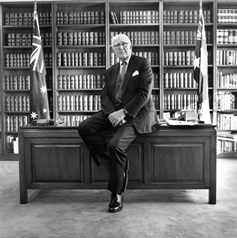
Malcolm
Fraser
Image courtesy of Polixeni Papapetrou and State Library of Victoria.
Watch: Condolence motions in the House of Representatives
|
|
24 March
|
Member for Bowman is suspended from the House
Mr
Andrew Laming MP (Lib, Bowman, Qld) is suspended from the House for
disorderly conduct. To give emphasis to his speech on a motion relating to
cruise liner emissions (in the Federation Chamber the previous evening), Mr
Laming pours crude oil over his hands, spilling it onto the desk and chamber
carpet. In suspending the Member for Bowman, the Speaker, Bronwyn Bishop MP, says:
Setting
aside the member's offence in making use of props, it is highly disorderly to
bring dangerous and flammable substances into either of the chambers. I
consider the member's actions to be totally disorderly, disrespectful of the
House and the Federation Chamber, and potentially dangerous to the health and
safety of members and staff of the Federation Chamber. I understand that
there has been damage to the Federation Chamber which we are endeavouring to
repair.[125]
Mr Laming subsequently pays $256 for the
costs of the repairs.[126]
|
Watch: Mr Laming’s speech in the Federation Chamber
|
|
26 March
|
Parliament House security upgrade
Both the House of Representatives and the Senate approve a
proposal to upgrade the security of Parliament House. The new security
measures to be taken include a perimeter fence, a gatehouse facility at the
Ministerial Wing entrance, and additional vehicle bollards.[127] The proposed
works are referred to the Senate Finance and Public Administration
Legislation Committee for inquiry and report by 13 May 2015.[128]
|
|
|
21 April
|
Secretary leaves Department of Parliamentary Services
(DPS)
Carol Mills’ appointment as Secretary of DPS is
terminated.
Ms Mills has been the subject of criticism in a Privileges
Committee report
on the Department of Parliamentary Services’ use of CCTV footage in an
internal disciplinary matter tabled in December 2014—criticism which she has
rebutted.[129]
(The Senate adopts the recommendations of the Privileges Committee report on
12 February).[130]
In February 2015 an ANAO report
highlighted weaknesses in the management of assets and contracts at
Parliament House. The performance of the Department of Parliamentary Services
(DPS) is also the subject of an inquiry
before the Senate Standing Committee on Finance and Public Administration.
(The inquiry is completed
in September 2015.)
The new Secretary, Mr
Robert Stefanic, takes up his position on 14 December 2015, the Parliamentary
Librarian having acted in that position in the interim.
|
|
|
6 May
|
New leader for the Australian Greens
Victorian Senator
Richard Di Natale is elected as leader of the Australian Greens following
the resignation
of Senator Christine Milne from that position.[131] Senator
Milne has served as party leader since April 2012.
Senators
Larissa Waters (Qld) and Scott
Ludlam (WA) are elected as co-deputy leaders of the party.
|

Senator Richard Di Natale
Image
source: Parliament of Australia
|
|
6 May
|
New senator for New South Wales
Jennifer McAllister (ALP) is appointed by joint sitting of the two
Houses of the NSW Parliament to the casual vacancy created by the resignation
of Senator John Faulkner on 6 February.[132]
Senator McAllister is sworn in on 11 May.
The delay in the senator’s appointment is due to the NSW
Parliament’s being in recess ahead of the state election in March 2015. While
the Constitution (section 15) provides that:
the Governor of the
State, with the advice of the Executive Council thereof, may appoint a person
to hold the place until the expiration of fourteen days after the beginning
of the next session of the Parliament of the State, or until the election of
a successor, whichever first happens
NSW does not avail itself of that provision, ‘thus denying
itself full representation in the Senate for the autumn sittings’.[133]
On 26 March the Senate agrees to an
Opposition motion reaffirming the view that ‘casual vacancies in the
Senate should be filled as expeditiously as possible’ and calling on the NSW
Government and Parliament to ‘ensure that the people of that
state are not denied full representation in the Senate for any time longer
than is strictly necessary’.[134]
|
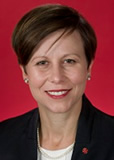
Senator Jennifer McAllister
Image source: Parliament of Australia
|
|
12 May
|
Budget 2015
The Treasurer, Joe Hockey MP, hands down
the 2015 Budget. It is Mr Hockey’s second Budget, and he tells the House:
This
budget is responsible, measured and fair. We are creating opportunities for
job seekers, young and old. We are caring for our most vulnerable. And we are
keeping the country safe and secure. ... This is a budget as much for the
miners of the Pilbara as it is for the farmers in the Mallee. It is as much
for a family in Brisbane as it is for a start-up business in Adelaide.This is
a budget that helps build a stronger, safer and more prosperous Australia. [135]
In his speech in reply on 14 May,
Opposition Leader Bill Shorten MP says:
The test
for this budget was to plan for the future, to lift productivity, to create
jobs, to boost investment, to turbocharge confidence for the years and
decades ahead, to restore hope, but this budget fails every test. It is a
hoax, a mirage, a smokescreen.[136]
|

Joe Hockey
Image
source: Parliament of Australia
|
|
12 May
|
Centenary of Gallipoli – Motion by the
Prime Minister
In a motion marking the centenary, on 25
April 2015, of Australian and New Zealand troops landing at Gallipoli, the Prime Minister says:
On Anzac Day, the Leader of the Opposition and I
stood together with thousands of Australians and New Zealanders on the
distant shores of Gallipoli ... (W)e paid our respects to the Anzacs whose
spirit has moved our people for a century. We went to honour the generation
of young men who rallied to serve our country when our country called and who
were faithful even unto death.
At dawn at Anzac Cove and later at Lone Pine, these
places of peace that were once battlefields, we remembered the original
Anzacs. This parliament was only 13 years old when the Great War broke out.
This parliament still sat in Melbourne. Nine sitting MPs served in the Great
War. In all, some 120 members of the Commonwealth parliament served in World
War I. On behalf of all members, I pay my respects to them ...
On every Anzac Day, the phrase echoes around our
services: 'Lest we forget'. But we have not forgotten and we will not forget.[137]
|
|
|
21 May
|
New senator for Queensland
Senator Joanna Lindgren (Lib) is appointed by the Queensland Parliament to
the casual vacancy caused by the resignation of Senator Brett Mason;[138] she is sworn in on 15 June.
In her first speech, Senator Lindgren pays tribute to her great uncle, Neville Bonner, long-serving senator for
Queensland (Lib, Ind, Qld, 1971-83) and the first Indigenous Australian to
sit in the Australian Parliament.[139]
|
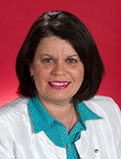
Senator Joanna Lindgren
Image source: Parliament of Australia
Watch: Senator Lindgren’s first speech
|
|
27 May
|
Remonstrance from the Norfolk Legislative Assembly
The Speaker of the Norfolk Island Legislative Assembly, David
Buffett, delivers both Houses of Parliament a Remonstrance,
setting out the Assembly’s grievances regarding the removal of
self-government ‘without genuine consultation and negotiation’.[140] (A
remonstrance is a formal document setting out grievances or complaints and
seeking their redress.)
Norfolk Island, an Australian external territory, has
enjoyed partial self-government since 1979, with its government responsible
for the delivery of local, state and some commonwealth services. However, a
series of Commonwealth government and parliamentary reports have indicated
the need for major reforms in administration, social services, finance and
governance. The Norfolk
Island Legislative Amendment Act 2015, which receives Royal Assent on
26 May, abolishes the Norfolk Island Legislative Assembly and replaces
it with an Advisory Council, which will transition to an elected Regional
Council with local and municipal responsibilities from July 2016.[141]
|
|
|
1 June 2015
|
Motion of dissent moved
The Opposition moves a motion of dissent from a ruling
made by the Speaker, Bronwyn Bishop MP, that a question directed at the
Minister for Agriculture, Barnaby Joyce MP is out of order.[142]
The motion is defeated.[143]
Motions of this type are rarely moved.
|
|
|
11 June 2015
|
New Commonwealth Auditor-General
Grant Hehir is appointed to a ten-year term as
Auditor-General for Australia.[144]
Mr Hehir had previously served as the Auditor-General of New South Wales.[145]
The Auditor-General is an independent officer of the
Parliament, appointed by the Governor-General on the recommendation
of the Joint Committee of Public Accounts and Audit (JCPAA)[146]
and the Prime Minister.[147]
The role involves assisting the parliament by scrutinising and reporting on
the performance and actions of the Executive.[148]
|
|
|
15 June
|
Magna Carta birthday celebrations
2015 sees a worldwide program of events to mark the 800th
anniversary of the Magna Carta.
Parliament House, home to one of only four known surviving manuscripts of the
1297 issue of the Magna Carta, hosts a busy program of events.
On the morning of 15 April, the Presiding Officers, the
Prime Minister and the Leader of the Opposition, Bill Shorten MP, celebrate
the anniversary at a reception in the Great Hall of Parliament House—which
has the distinction of being the first Magna Carta anniversary celebration in
the world. Speaking at the event, the Prime Minister describes the Magna
Carta as ‘perhaps the most important constitutional document of all time,
that has shaped our history and that of so much of the modern world’.[149] That
evening, 600 people gather in the Great Hall for a special ‘Magna Carta’ edition
of the ABC’s Q&A program.
In May the President of the Senate, Senator Stephen Parry,
launches the second edition of ‘Australia’s
Magna Carta’.
In June, the British High Commissioner to Australia, Menna
Rawlings CMG, presents a Senate Occasional Lecture on the Magna Carta.
Later that month, the Prime
Minister delivers the British High Commission’s annual Magna Carta Lecture
On 9 July, the Great Hall is the venue for the National
Archives’ Constitution Day Speakers’ Forum on the Magna Carta broadcast by Radio National’s Big Ideas program.
And in October the Department of the Senate and the Rule of Law Institute of Australia
jointly host a two day Magna
Carta Symposium.
|
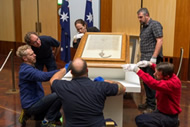
DPS staff install the Magna Carta in the Great
Hall of Parliament House for the 800th anniversary event
Image source: Auspic
Watch:
The Magna Carta 800th Anniversary
Celebration
The Senate Occassional Lecture by Her Excellency Mrs
Menna Rawlings CMG
Big Ideas Constitution Day Speakers’ Forum: Magna
Carta
Magna Carta Symposium part one
and part two
Read: The Prime Minister’s Magna Carta Lecture
|
|
17 June
|
First time former opposing
state/territory leaders in the same chamber
Former ACT Chief Minister, now senator for
the ACT, Katy Gallagher (ALP), gives her first speech in the Senate.
Senator Gallagher is chosen by the ACT Legislative Assembly on 25
March 2015 to represent the Territory in the Senate after the resignation of Senator Kate Lundy (ALP).[150] She is sworn in on 26 March 2015.[151]
Senator Gallagher’s appointment to the
casual vacancy marks the first time that a Premier or Chief Minister has faced their
former opposition counterpart in the same chamber in the same Parliament. Senator Zed Seselja (Lib, ACT) was Leader of the ACT
Opposition (December 2007—June 2013) before resigning to stand for the
Senate at the 2013 election.
|

Senator Katy Gallagher
Image
source: Parliament of Australia
Watch: Senator Gallagher’s first speech
Read: Simon Speldewinde, ‘First time opposing state/territory leaders in the
same chamber’, FlagPost, Parliamentary
Library 17 June 2015
|
|
25 June
|
Report on Constitutional Recognition of
Aboriginal and Torres Strait Islander Peoples
The Joint Select Committee on Constitutional
Recognition of Aboriginal and Torres Strait Islander Peoples publishes its final report. A key recommendation of the
report is that ‘a referendum be held on the matter of recognising Aboriginal
and Torres Strait Islander peoples in the Australian Constitution’.[152]
|
|
|
1 July
|
Australian Border Forces commences
operations
The Australian Border Force (ABF) begins
operating within the Department of Immigration and Border Protection, which
merges with the Australian Customs and Border Protection Service on the same
date. The creation of the ABF was announced in the 2014-15 Budget. Its
establishment marks a shift in the focus of the Department of Immigration –
from nation building and migrant settlement towards a stronger emphasis on
border security – the biggest transformation in the Department’s 70-year
history.[153]
|
|
|
17 July
|
National memorial service marking the
anniversary of the downing of flight MH17
On 17 July a national memorial service is
held in the Great Hall of Parliament House to commemorate the lives lost in
the downing of MH17 over the Ukraine.
A memorial plaque is unveiled in the House
of Representatives Eastern Formal Gardens the same day.
|
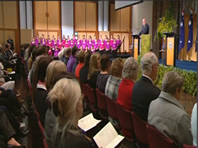
The Governor-General addresses the National Memorial
Service honoring the victims of Flight MH17
Image source. Parlview video
Watch: the National Memorial Service
Read: the addresses to the
MH17 National Memorial Service by His Excellency Sir Peter Cosgrove and the Prime Minister, Tony Abbott MP
|
|
21 July
|
Death of the Member for Canning
Liberal MP Don Randall dies in Boddington, WA. Mr Randall has
represented the electorate of Canning (WA) since 2001, having previously
served as the Member for Swan (1996-1998).
Mr Randall’s death is marked by a minute’s silence and several speeches in
Adjournment in the Senate, and by a condolence motion in the House of Representatives.[154] A white rose is placed on Mr Randall’s desk.
On 17 August, the Speaker informs the House of Representatives that the
by-election to fill the vacancy in the division of Canning will be held on 19
September. It is won by the Liberal candidate, former SAS officer Andrew Hastie, with 55.26% of votes (two party preferred), a 6.5% swing against the government. He is sworn in on 12 October and gives his first speech on 13 October.
|
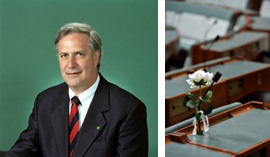
Don
Randall
Image source: Auspic
Watch: the condolence motion in the House of
Representatives

Andrew
Hastie MP
Image source: Auspic
|
|
2 August 2015
|
Resignation of the Speaker
Bronwyn Bishop MP resigns as Speaker of the House of
Representatives,[155] the third resignation of a Speaker since 2011,
and the ninth since 1901.[156] Mrs Bishop’s resignation follows sustained criticism of her use of travel entitlements,
in particular the use of a chartered helicopter to attend a Liberal Party
function.
That same day the Prime Minister, Tony
Abbott MP, announces the establishment of a committee
to review the parliamentary entitlements system, co-chaired by the former
Secretary of the Department of Finance, Mr David Tune AO PSM, and the Chair
of the Remuneration Tribunal, Mr John Conde AO. The committee releases its report in March 2016.[157]
|
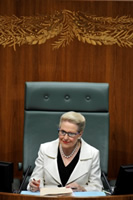
Former Speaker Bronwyn Bishop
Image source: Auspic
|
|
10 August
|
A new Speaker of the House of
Representatives
Tony
Smith MP (Lib, Casey, Vic.) is elected unopposed to the position of Speaker
of the House of Representatives, the 32nd person to hold this office. In his
address to the chamber Mr Smith says:
I thank
the House for the confidence you have placed in me. There is no greater
honour within the parliament than to be elected by one's peers. I am a
servant of this House and all of its members. There is, however, a mutual
obligation between presiding officers and individual members. I want to say
at the outset that I will give a fair go to all on the floor of this chamber.
But in return I do expect a level of discourse that reflects that.
Parliament
is a robust place. It should be a robust place. It is where we battle our
view of a better Australia. It is the arena for the battle of ideas and
ideals. I make that point because often people say parliament should not be
robust. It should, but it need not be rude and it need not be loud.[158]
In the same address, Mr Smith also indicates that
he will not be attending weekly party meetings while he is Speaker.[159]
|
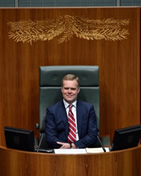
Tony Smith MP, Speaker of the House of
Representatives
Image source: Parliament of Australia
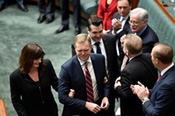
Speaker Tony Smith being conducted to
the Speaker’s Chair
Image source: Auspic
Watch: The election of the Speaker
|
|
13 August
|
Family Court fee increases
The Federal Court rejects a legal challenge that would have
forced the federal government to refund an estimated $1 million in extra
court fees for divorce applications. The application, brought by Graham Perrett MP (ALP, Moreton, Qld), Senator Claire Moore (ALP, Qld) and three
divorce applicants, sought to strike out Commonwealth regulations raising
Family Court fees. The fees had been raised for less than a month before they
were disallowed by the Senate on 11 August.
The Attorney-General, Senator George Brandis, had reintroduced the increases
by regulation after the Senate blocked a previous attempt in June.[160]
|
|
|
17 August
|
Cross-party bill on same-sex marriage
A bill introduced into the House of Representatives by Warren
Entsch MP (Lib, Leichhardt, Qld) and co-sponsored by MPs Teresa
Gambaro (Lib, Brisbane, Qld), Terri
Butler (ALP, Griffith, Qld), Laurie
Ferguson (ALP, Werriwa, NSW), Adam
Bandt (AG, Melbourne, Vic.), Cathy
McGowan (Ind, Indi, Vic.) and Andrew
Wilkie (Ind, Denison, Tas.) is the first cross-party bill on same-sex
marriage to be introduced into the parliament. It follows a bill introduced
into the House by Opposition leader Bill Shorten on 1 June 2015, which was
the first time a leader of a political party had introduced a same-sex
marriage bill.[161]
On 19 August 2015, the Marriage
Equality Plebiscite Bill 2015 is introduced
into the Senate. The bill lapses at the prorogation of the 44th
Parliament. A subsequent bill, the Plebiscite
(Same-Sex Marriage) Bill 2016 is defeated in November 2016.[162]
The parliaments of New South Wales,[163]
Western Australia,[164]
and Tasmania[165]
have each passed motions opposing the proposed plebiscite.[166]
|
|
|
17 August
|
Australia Post issues new Parliament
House stamp
The President of the Senate, Senator Stephen
Parry, launches an Australia, New Zealand and Singapore joint stamp issue
marking 50 years of bilateral relations between the three countries.
Designed by Sonia Young of Australia Post,
the stamps feature the parliament houses of the three countries.[167]
|

Senator Stephen Parry, President of the Senate
Image Source: Auspic
|
|
19 August
|
New Tasmanian senator
Nick McKim (Australian Greens) is appointed by the Parliament of Tasmania to
the casual vacancy caused by the resignation of Senator Christine Milne on 10
August.[168]
Senator McKim is sworn in 20 August 2015 and
delivers his first speech on 9 September.
|

Senator Nick McKim
Image
source: Parliament of Australia
Watch: Senator McKim’s first speech
|
|
20 August
|
Women athletes
In 2015, Australian women excel on the
sporting field, and the issue of equal pay for women athletes receives
increased attention.
A reception is held at Parliament House for
the Australian Diamonds netball team, following the team’s victory in the
Netball World Cup on 16 August. Prime Minister Tony Abbott, a self-described
‘netball dad’, describes the win as an ‘extraordinary victory’.[169] Opposition leader Bill Shorten says ‘(t)here is no doubt that elite
women professional athletes have not received the equal treatment they
deserve in Australian sport.’[170]
The Australian Women’s Cricket Team, the
Southern Stars, are recognised in September for their victory over England in
the Ashes series.[171] In November 2015, Prime Minister Malcolm Turnbull and Opposition
Leader Bill Shorten both congratulate jockey Michelle Payne for her historic
Melbourne Cup victory.[172]
Meanwhile, the Australian women’s soccer
team, the Matildas, are engaged in a pay dispute with the Football Federation
Australia.[173] The Senate passes a motion supporting ‘fair working conditions for
all female Australian athletes.’[174]
|
Watch: Reception for the Diamonds netball team
|
|
21 August
|
Anniversary of parliamentary broadcasting
The Senate celebrated 25 years since the
proceedings of the chamber were first televised in 1991. Daily sessions of
the House of Representatives began to be televised in 1991. Prior to 1991,
television broadcasts of Parliament had taken place on 17 February 1959 (for
the opening of the 23rd Parliament) and in 1974 (for the joint sitting of
Parliament).[175]
|
|
|
8 September
|
Motion concerning John Dyson Heydon AC QC
Senator
Penny Wong (ALP, SA) moves a motion requesting that the Governor-General
revoke the Letters Patent issued to John Dyson Heydon AC QC, on the grounds
that Mr Heydon, who is conducting the Royal Commission into Trade Union
Governance and Corruption, ‘by his conduct in accepting an invitation to
speak at a function raising campaign funds for the Liberal Party of Australia
... has failed to uphold the standards of impartiality expected of a holder of
the office of Royal Commissioner’.[176]
In her statement regarding the motion, Senator Wong states that ‘it is
untenable for a royal commissioner who is conducting a politically charged
inquiry to be politically compromised.’ The motion is unsuccessful.[177]
Such a motion has not been moved since 1931.[178]
|
|
|
15 September
|
A new Prime Minister and a new ministry
Malcolm
Turnbull MP (Lib, Wentworth, NSW) is sworn in as Australia’s 29th
Prime Minister. This follows his resignation from the ministry on 14
September, citing the failure of Prime Minister Tony Abbott to
provide economic leadership. Mr Turnbull wins the resultant leadership
ballot 54 votes to 44, becoming Australia’s fourth prime minister since the
2007 election.
It is the fourth leadership spill in the Liberal Party
since the 2007 election, and follows a failed leadership spill motion on 9
February.[179]
Mr Abbott has been Prime Minister for only 726 days; he leaves office
declaring that ‘there
will be no wrecking, no undermining and no sniping’.[180]
Julie Bishop MP (Lib, Curtin, WA) defeats Kevin Andrews MP
(70 votes to 30) for the position of Deputy Leader—a position which she has
held since 2007, serving
with three opposition leaders and two prime ministers.[181]
Mr Turnbull announces his
new Ministry on 20 September,[182]
increasing to five the number of women in Cabinet and the number of women in
the Ministry overall to nine.
The Member for Hasluck (WA), Ken
Wyatt MP, is appointed as Assistant Minister for Health, and is the first
Indigenous Australian to be appointed to the Executive Council.
Wyatt
Roy MP (Lib, Longman, Qld) becomes the youngest ever Commonwealth
minister (25) when he is commissioned Assistant Minister for Immigration—a
record previously held by Kate
Ellis MP (ALP, Adelaide, SA) who in 2007 became a minister at the age of
30.
Senator
Marise Payne (NSW) is appointed Minister for Defence, and is, the Prime
Minister says, ‘the first woman to be Minister for Defence in our nation’s
history’.[183]
Other female parliamentarians have previously held Defence-related
ministries/assistant ministries.
|
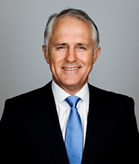
Prime Minister Malcolm Turnbull MP
Image source: Department
of Prime Minister and Cabinet webpage
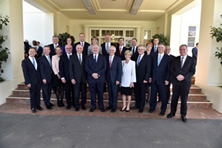
Turnbull Cabinet
Image source: Auspic
Watch: Malcolm Turnbull announcing his new ministry
|
|
16 September
|
National Disability Insurance Scheme agreement
In one of his first official duties as Prime Minister,
Malcolm Turnbull announces agreements between the Commonwealth and the
governments of New South Wales and Victoria to roll out the National
Disabilities Insurance Scheme (NDIS) in those states (with negotiations with
other states and territories to continue).[184]
The Prime Minister states that ‘(t)his marks a huge milestone towards the
delivery of one of the largest social policy reforms in our nation’s
history.’[185]
|
|
|
22 September
|
New senator for South Australia
Robert Simms (Australian Greens) is appointed[186] to the Senate by the Parliament of South Australia to fill a casual
vacancy caused by the resignation of Senator Penny Wright on 10 September 2015;[187] he is sworn in as a senator on 12 October and makes his first speech the next day.
He is the fifth senator to be appointed to a
casual vacancy in 2015.
|

Senator
Robert Simms
Image source: Parliament of Australia
Watch: Senator Simms’ first speech
|
|
15 October
|
‘Anthea’s law’
The Attorney-General, Senator George Brandis, and Senator
Nick Xenophon (Ind, SA) co-sponsor the Crimes
Legislation Amendment (Harming Australians) Bill 2015. The bill extends
the retrospective application of the offences of murder and manslaughter of
Australians overseas.[188]
(The existing offences were originally introduced in 2002 with only very
limited retrospectivity to capture the Bali Bombings in October that year.)
The provisions enable prosecution of these offences in Australia under
Australian law should the foreign country not properly investigate the crime.[189]
Senator Xenophon had introduced an
earlier version of the Bill in 2013 in response to the murder of
Anthea Bradshaw-Hall in Brunei in 1994.[190]
The Bill passes both Houses of Parliament and receives
Royal Assent on 30 November.
|
|
|
21 October
|
Former Treasurer Joe Hockey leaves parliament
Joe Hockey MP gives his valedictory
speech, after announcing his resignation on 21 September following a
reshuffle which saw him replaced as Treasurer by Scott
Morrison MP (Lib, Cook, NSW).[191]
Mr Hockey is later appointed Australia’s ambassador to the United States of
America.[192]
|
|
|
22 October
|
Electronic petitions
The Speaker, Tony Smith MP, informs members that the
Departments of the House of Representatives and of Parliamentary Services are
working to develop an electronic petitions website and system for the House,
foreshadowing the need for the House to consider changes to its Standing
Orders.[193]
Senate standing orders already enable the presentation of electronic
petitions in that chamber (SO 70).
The Standing Orders of the House are amended
in 2016 to provide for an electronic
petitions system.
|
|
|
9 November
|
House of Representatives trials new arrangements for
Question Time
The House begins a trial of new arrangements for Question
Time under which time is set aside each day for private government members to
ask ministers constituency questions. Announcing the change, the Prime
Minister, Malcolm Turnbull MP, says
‘local issues are absolutely the bread and butter of every
member's job’.[194] The changes will be trialled until the end of the year.[195]
|
|
|
15 November
|
Parliament House illuminated for France
Parliament House is illuminated with the French Tricolore
as a mark of solidarity with the people of France in the wake of a series of
terrorist attacks in Paris on 13 November. Parliament House
continues to be illuminated until 22 November.
When Parliament resumes on 23 November, the Prime Minister,
Malcolm Turnbull, MP, [196] and the Leader of the Opposition,
Bill Shorten, MP,[197]
express their condolences.
|
<img alt="Parliament House illuminated with the French Tricolore
" src="%7E/media/05%20About%20Parliament/54%20Parliamentary%20Depts/544%20Parliamentary%20Library/Research%20Papers/2016-17/Chronology/APH2014-15-55" />
Parliament House illuminated with the French
Tricolore
Image
source: Auspic
Read:
Mr Turnbull’s statement
Mr Shorten’s statement
Watch: the Prime Minister and Leader of the Opposition’s
statements on the Paris terrorist attacks
|
|
18 November
|
The ‘Big Picture’ on the move
The Tom Roberts painting The Opening of the first
Parliament of the Commonwealth of Australia by HRH Duke of Cornwall and York
(later King George V) on May 9, 1901 is removed from its home in the
foyer of the Main Committee Room and loaned to the National Gallery of
Australia.
There it is the centrepiece of a major Tom Roberts exhibition
(December 2015 to March 2016). It will be returned to Parliament House during
the 2016 autumn recess.
This is the first time the painting—which weighs over
400kg and stands almost 4m high—has left Parliament House since its
installation in 1988.
|
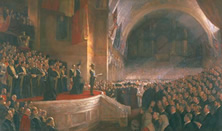
Tom Roberts, Opening of the First
Parliament of the Commonwealth of Australia by H.R.H. The Duke of Cornwall
and York (Later King George V), May 9, 1901, 1903, oil on canvas
Image source: Parliament of Australia
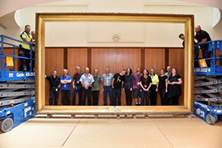
The
team involved in the move
Image
source: Auspic
|
|
24 November
|
Prime Minister’s statement on national security
In the wake of recent terrorist attacks, the Prime
Minister makes a statement
to inform the House about ‘Australia’s global, regional and domestic
policies to respond to terrorist attacks’.[198]
He states that the ‘threat from ISIL is a global problem that
must be addressed at its source, in the Middle East’. However, ‘governments
cannot win this battle alone. Community leaders and groups have great
responsibility both in denouncing violent extremism and teaching unity in
diversity’.
|
Watch: the Prime Minister’s National Security Statement
|
|
25 November
|
White Ribbon Day—cross-party motions and new research
on domestic and family violence
On the International Day for the
Elimination of Violence Against Women/White
Ribbon Day, the Senate agrees a cross party motion
noting that ‘across the world, violence against women and girls remains one
of the most serious and the most tolerated human rights violations’.[199] Senator
Claire Moore introduces the motion on behalf of Senators Michaelia
Cash (Lib, WA), Sue
Lines (ALP, WA) and Larissa Waters (AG, Qld).
On 11 November the Senate passed a related motion
sponsored by the four senators, marking the release of a new
report on family violence and ‘acknowledging the need for a cross party
approach to enforcing a long-term strategy for ending the scourge of family
and domestic violence.’[200]
Also on 25 November, Prime Minister Malcolm Turnbull and
the Ministers for Women (Senator Michaelia Cash) and Human Services (Christian
Porter MP), jointly
release a report entitled ‘Reducing
violence against women and their children’.[201] The research
will inform the development of a jointly funded national campaign to begin in
early 2016.
|
|
|
25 November
|
Tjuringa gifted to the Parliament and the Australian
people by the Warlpiri people
On behalf of the Parliament, the President of the Senate,
Senator Stephen Parry, and the Speaker of the House of Representatives, Tony
Smith MP, accept the gift of a tjuringa (a traditional Indigenous ceremonial
object).
The tjuringa had originally been given by the Warlpiri
people to the then Minister for Aboriginal Affairs, Ian Viner AO QC in 1978,
in exchange for the title deed to their traditional lands at Yuendumu
(Northern Territory).[202]
|
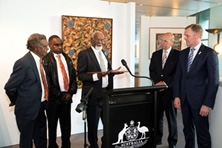
Warlpiri community representatives Harry Tjakamarra
Nelson, Otto Jungarryi Sims and Robin Granites Japanangka with the President
and the Speaker
Image source: Auspic
|
|
2 December
|
Nursing mothers in the House
On 2 December the House of Representatives Procedure
Committee tables the report
of its inquiry
into the adequacy of provisions for nursing mothers in the Chamber.[203] This
follows the Committee’s roundtable discussions with members of the House on
12 November.
Current Standing Orders include ‘special provisions for
nursing mothers’, enabling them to vote by proxy ‘for any division except
that on the third reading of a bill which proposes an alteration of the
Constitution’ if they are nursing an infant at the time of the division.[204]
The Committee recommends that standing orders be amended
to allow members to bring their infants into the Chamber and Federation
Chamber when needed so that members are able to participate fully in the work
of the House. The Government
response, tabled in February 2016, accepts the Committee’s
recommendation.[205]
Since 2003, Senate standing orders (175.3) have permitted
a senator to bring an infant into the chamber while breast‑feeding but
not at other times.[206]
|
|
|
5 December
|
North Sydney by-election
On 5 December the by-election for North
Sydney is held following the resignation of the Treasurer, Joe Hockey, on 23 October.
Liberal candidate Trent Zimmerman is elected as the Member for
North Sydney. He wins the seat (by a margin of 15,575 votes two-party
preferred).[207]
Mr Zimmerman is subsequently sworn-in when
Parliament meets in February 2016.
|
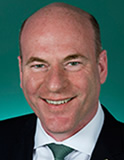
Trent
Zimmerman MP
Image source: Parliament of Australia
|
|
29 December
|
Ministerial responsibility: one resigns,
another stands aside
Prime Minister Malcolm Turnbull announces the resignation of the Minister
for Cities and the Built Environment, Jamie Briggs MP (Lib, Mayo, SA), for failing
to ‘uphold high standards of behaviour as set out in the Ministerial
Standards’.[208] Mr Briggs issues a media release attaching his letter to the Prime
Minister regarding the matter.[209]
Mr Turnbull’s media release also announces that
Mal Brough MP (Lib, Fisher, Qld) has stood
aside as Special Minister of State and as Minister for Defence Materiel and
Science, pending the completion of an AFP investigation into the unauthorised
disclosure of the diary of the former Speaker Peter Slipper MP.
In January Mr Brough is reported as asking
to return to a back bencher’s salary and office pending the conclusion of the
investigation.[210]
|

Jamie Briggs
Image source: Parliament of Australia
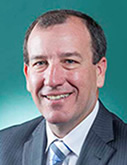
Mal Brough
Image
source: Parliament of Australia
|
Appendix 1: Key Commonwealth Acts passed in 2014
|
Administrative law
|
|
Omnibus Repeal Day (Autumn 2014) Act 2014
|
D Spooner, J Chowns,
Omnibus Repeal Day (Autumn 2014) Bill 2014, Bills digest,
no. 67, 2013‑14, 9 May 2014.
|
This Act is part of a
package of repeal Acts which remove duplication between different levels of
government and between different agencies of government. Many of the amendments
repeal provisions have long ceased to have effect.
|
|
Amending Acts 1901‑1969 Repeal Act 2014
|
J Murphy, Amending Acts
1901‑1969 Repeal Bill 2014, Bills digest,
no. 59, 2013‑14, 8 April 2014.
|
To repeal over 1,000
amending and repeal Acts identified by the Government as being redundant.
|
|
Amending Acts 1970 to 1979 Repeal Act 2014
|
K Magarey, Amending Acts
1970 to 1979 Repeal Bill 2014, Bills digest,
no. 57, 2014‑15, 27 November 2014.
|
To repeal 656 amending and
repeal Acts identified as redundant.
|
|
Energy law
|
|
Minerals Resource Rent Tax Repeal and Other Measures
Act 2014
|
|
An Act to remove the minerals resource rent tax, or mining
tax, among other things.
|
|
Carbon Farming Initiative Amendment Act 2014
|
K Swoboda, A St John,
J Tomaras, Carbon Farming Initiative Amendment Bill 2014, Bills digest,
no. 23, 2014‑15, 3 September 2014.
|
Amends the Carbon
Credits (Carbon Farming Initiative) Act 2011 to implement the main part
of the Coalition Government’s ‘direct action’ emissions reduction policy—the
establishment of arrangements to support the purchase of domestic emissions
abatement through the ‘emissions reduction fund’.
|
|
Clean Energy Legislation (Carbon Tax Repeal) Act
2014
|
|
Part of a package of 8
bills to remove the carbon pricing mechanism.
|
|
Family law
|
|
Australian Citizenship Amendment (Intercountry
Adoption) Act 2014
|
M Neilsen, Australian
Citizenship Amendment (Intercountry Adoption) Bill 2014, Bills digest,
no. 8, 2014‑15, 14 July 2014.
|
To create an entitlement to
citizenship for children adopted under bilateral arrangements equivalent to
the entitlement currently provided for children adopted under Hague
Convention arrangements.
|
|
Immigration and
Refugee law
|
|
Migration and Maritime Powers Legislation Amendment
(Resolving the Asylum Legacy Caseload) Act 2014
|
E Karlsen, J Phillips, H Spinks, Migration and Maritime
Powers Legislation Amendment (Resolving the Asylum Legacy Caseload) Bill 2014,
Bills
digest, no. 40, 2014‑15, 23 October 2014.
|
The measures broaden the
maritime enforcement powers used to intercept and return vessels carrying asylum
seekers.
|
|
Tax law
|
|
Tax Laws Amendment (Temporary Budget Repair Levy)
Act 2014
|
B Pulle, K Swoboda,
T Dale, Tax Laws Amendment (Temporary Budget Repair Levy) Bill 2014,
Bills digest,
no. 89, 2013‑14, 16 June 2014.
|
One of a package of 15
Bills which is a temporary tax for 3 financial years to improve the fiscal
balance.
|
|
Terrorism and
National Security law
|
|
National Security Legislation Amendment Act (No. 1)
2014
|
M Biddington, C Barker, National
Security Legislation Amendment Bill (No. 1) 2014, Bills digest,
no. 19, 2014‑15, 28 August 2014.
|
The main purpose of the
Bill is to implement recommendations made in Chapter 4 of the PJCIS’s Report of the Inquiry into Potential Reforms of
Australia’s National Security Legislation.
|
|
Counter-Terrorism Legislation Amendment (Foreign
Fighters) Act 2014
|
C Barker, M Biddington,
M Coombs, M Klapdor, Counter-Terrorism Legislation Amendment (Foreign
Fighters) Bill 2014, Bills digest,
no. 34, 2014‑15, 17 October 2014.
|
To make amendments to
several existing Commonwealth Acts, to address the Government’s response to
the increased threat of terrorism posed by Australians engaging in, and
returning from, conflicts in foreign States.
|
Appendix
2: Key Commonwealth Acts passed in 2015
|
Administrative law
|
|
Treasury Legislation Amendment (Repeal Day) Act 2015
|
L Nielson and K Swoboda, Treasury
Legislation Amendment (Repeal Day) Bill 2014, Bills digest,
no. 67, 2014‑15, 4 February 2015.
|
To repeal redundant
provisions and to rewrite existing provisions into more accessible and easily
used forms and location.
|
|
Amending Acts 1980 to 1989 Repeal Act 2015
|
K Magarey, Amending Acts
1980 to 1989 Repeal Bill 2015, Bills digest,
no 103, 2014–15, 12 May 2015.
|
To remove a significant
number of ‘spent Acts’ – amending or repealing Acts which are no longer
required as the legal changes they were designed to make have occurred. Schedule
1 repeals 870 obsolete or redundant amending or repeal Acts.
|
|
Norfolk Island Legislation Amendment Act 2015
|
C Madden, Norfolk Island Legislation Amendment Act 2015, Bills digest, no. 102, 2014–15, 12 May 2015.
|
Introduced to radically
overhaul the governance arrangements that currently operate on NI and starts
the transition of NI from a self-governing territory to a modern local
government type authority.
|
|
Family law
|
|
Enhancing Online Safety for Children Act 2015
|
G Butler, Enhancing
Online Safety for Children Bill 2014, Bills digest,
no 78, 2014–15, 2 March 2015.
|
The Bill creates a new
statutory office, the Children’s e-Safety Commissioner, and provides for the
Commissioner to administer a complaints scheme regarding harmful
cyber-bullying material targeted at an Australian child.
|
|
Terrorism and
National Security law
|
|
Australian Border Force Act 2015
|
C Barker, Australian Border Force
Bill 2015 [and] Customs and Other Legislation Amendment (Australian Border
Force) Bill 2015, Bills digest,
no. 94, 2014–15, 7 May 2015.
|
To establish the Australian Border
Force and ABF Commissioner within the Department of Immigration and Border
Protection. The Commissioner will be responsible for enforcement of customs
laws and border-related revenue collection.
|
|
Telecommunications (Interception and Access)
Amendment (Data Retention) Act 2015
|
J Murphy and M Biddington, Telecommunications
(Interception and Access) Amendment (Data Retention) Bill 2014, Bills digest,
89, 2014–15, 26 March 2015.
|
Creates new obligations on
telecommunications and internet service providers to retain prescribed
information or documents (metadata) for a period of two years for the
purposes of access by national security authorities, criminal law-enforcement
agencies and enforcement agencies. The Bill also requires service providers
to encrypt the retained metadata (subject to certain exemptions).
|
|
Biosecurity
|
|
Biosecurity Act 2015
|
|
The Bill represents a major rewrite of
the Quarantine Act 1908 and is based not just on the quarantine power,
but also on a number of other Constitutional powers which provide the
foundation for broader coverage to address changing patterns of overseas
trade and Australia’s international obligations.
|
|
Courts
|
|
Tribunals Amalgamation Act 2015
|
M Coombs, C Petrie and D Spooner, Tribunals
Amalgamation Bill 2015, Bills digest,
no. 83, 2014–15, 19 March 2015.
|
To amend a number of Acts to
amalgamate the Social Security Appeals Tribunal and the Migration Review
Tribunal—Refugee Review Tribunal with the Administrative Appeals Tribunal.
|
|
Judiciary Amendment Act 2015
|
M Coombs, Judiciary Amendment Bill
2015, Bills digest,
no. 105, 2014–15, 13 May 2015.
|
To consolidate the Australian
Government Solicitor into the Attorney-General’s Department. The Bill implements
a decision announced part of the Government’s Smaller Government Reform
Agenda.
|
|
Citizenship law
|
|
Australian Citizenship Amendment (Allegiance to
Australia) Act 2015
|
M Harrison-Smith and C Barker, Australian
Citizenship Amendment (Allegiance to Australia) Bill 2015, Bills digest,
15, 2015–16, 2 September 2015.
|
The Bill will amend the Australian
Citizenship Act 2007 to provide for ‘automatic’ cessation of the
Australian citizenship (including that obtained at birth) of a dual national
where that person:
– renounces their Australian
citizenship by engaging in certain conduct relating to terrorism and ‘foreign
incursions’
– fights for, or is in the service of,
a ‘declared terrorist organisation’ outside Australia (expanding an existing
provision concerning serving in the armed forces of a country at war with
Australia) or
– is convicted of a specified offence.
|
|
Immigration and
Refugee law
|
|
Migration Amendment (Strengthening Biometrics
Integrity) Act 2015
|
MA Neilsen, Migration Amendment
(Strengthening Biometrics Integrity) Bill 2015, Bills digest,
no. 111, 2014–15, 4 June 2015.
|
To consolidate and strengthen the
legislative framework for the collection of personal identifiers under the Migration
Act 1958.
|
|
Migration Amendment (Regional Processing
Arrangements) Act 2015
|
|
To provide statutory authority which
applies where the Commonwealth has entered into an arrangement with another
country with respect to the regional processing functions of that country.
|
|
Health law
|
|
Australian Immunisation Register Act 2015
|
A Grove, Australian Immunisation
Register Bill 2015, Bills digest,
no. 25, 2015–16, 1 October 2015.
|
To create a consolidated legislative
framework to govern the operation of Australian immunisation registers and
to expand the age range covered by the
Australian Childhood Immunisation Register from children under seven to
‘young individuals’ under 20 years of age.
|
|
Social Services law
|
|
Social Services Legislation Amendment (No Jab, No
Pay) Act 2015
|
M Klapdor, Social Services
Legislation Amendment (No Jab, No Pay) Bill 2015, Bills digest,
no. 36, 2015–16, 22 October 2015.
|
Amends the A New Tax System (Family
Assistance) Act 1999 (the FA Act) to tighten the immunisation
requirements for the FTB-A supplement, CCB and CCR. It will remove the
exemption from the immunisation requirements for those who submit a
conscientious objection to immunisation and will remove the Minister for Social
Services’ power to exempt a class of persons from the requirements by
legislative instrument.
|
|
Criminal law
|
|
Crimes Legislation Amendment (Harming Australians)
Act 2015
|
J Mills, Crimes Legislation
Amendment (Harming Australians) Bill 2015, Bills digest,
48, 2015–16, 12 November 2015.
|
To amend the Criminal Code Act 1995
to extend the existing retrospective application of the offences of murder
and manslaughter of Australians overseas to apply to offences occurring prior
to 1 October 2002.
|
|
|
|
|
|
Property law
|
|
Register of Foreign Ownership of Agricultural Land
Act 2015
|
|
Establishes a register, operated by
the Australian Taxation Office, of foreign ownership of agricultural land.
|
|
Intellectual Property
law
|
|
Copyright Amendment (Online Infringement) Act 2015
|
|
To introduce a key reform to reduce
online copyright infringement.
|
[1]
T Abbott (Prime Minister), ‘Closing
the Gap: Prime Minister’s Report 2014’, House of Representatives, Debates,
12 February 2014, p. 156 ff. Please note: all internet sources in this paper
have been accessed between 19 and 21 December 2016 unless otherwise specified.
[2]
Department of Defence, ‘Corporal
Cameron Stewart Baird VC MG’, Department of Defence website.
[3]
Inquiry
into the 2013 WA Senate election, December 2013, Report commissioned by
the Australian Electoral Commission and produced by M J Keelty AO, 2
December 2013.
[4]
High Court of Australia, ‘The
Australian Electoral Commission v Johnston & Ors; Wang v Johnston &
Ors; Mead v Johnston& Ors’ [2014], HCA 5 Judgement Summary.
[5]
J Bishop (Minister for Foreign Affairs), ‘Questions
without notice: Australian Defence Force’, House of Representatives, Debates,
27 February 2014, p. 1167.
[6]
Australia, The Senate, Senate
Procedural Information Bulletin no. 279, Parliament of Australia website.
[7]
H Evans and R Laing, Odgers’ Australian Senate Practice, 13th
edition, Canberra, 2012, p. 589.
[8]
P Wong, ‘Motions:
Assistant Minister for Health, Censure’, Senate, Debates, 5 March
2014, p. 864; Senate, Censure
motions, Parliamentary business, Parliament of Australia.
[9] A
Sinodinos, ‘Australian
Water Holdings’, Senate, Debates, 19 March 2014, p. 1487.
[10]
P Wong, ‘Australian
Water Holdings’, Senate, Debates, 19 March 2014, p. 1460.
[11]
His Excellency General the
Honourable Sir Peter Cosgrove AK MC (Retd) and Her Excellency Lady Cosgrove,
Governor-General of the Commonwealth of Australia website; ‘Governor-General
swearing in ceremony’, Parliament of Australia, Canberra, 28 March 2014.
[12]
Governor-General of the Commonwealth of Australia website, ‘The Honourable Dame Quentin Bryce AD CVO and
Mr Michael Bryce AM AE’. The Knight/Dame of the Order of Australia was
offered between 1976 and 1986 and between 2014 and 2015.
[13]
T Burke, ‘Motions:
Speaker’, House of Representatives, Debates, 27 March 2014, p. 3404.
[14]
See Table 6.2: Motions of censure of or no confidence in the Speaker,
Acting Speaker or Deputy Speaker, and related motions, ‘Criticism
of Speaker’s actions and conduct’, in B C Wright, ed, House of
Representatives Practice, 6th edn, Department of the House of
Representatives, Canberra, 2012.
[15]
Australian Electoral Commission, Senators
for Western Australia have been decided, media release, 29 April 2014.
[16]
‘The year in review’,
Australian Electoral Commission Annual report 2013 ̶ 14,
Commonwealth of Australia, 2014.
[17]
Australian National Audit Office,
The Australian Electoral Commission’s storage and transport of completed ballot
papers at the September 2013 federal general election, Audit report no
31, 2013 ̶ 14, Performance audit, 2014; Parliament of the Commonwealth of
Australia, The
2013 federal election: report on the conduct of the 2013 election and matters
related thereto, Joint Standing Committee on Electoral Matters,
Canberra, April 2015.
[18]
Parliamentary
Reception in the presence of their Royal Highnesses the Duke and Duchess of
Cambridge, Parliament of Australia, 24 April 2014.
[19]
Australian Government, Budget
2014 ̶ 15; Budget
review 2014 ̶ 15, Research Paper series, 2013 ̶ 14,
Parliamentary Library, 30 May 2014.
[20]
Department
of Parliamentary Services Annual Report 2013 ̶ 2014.
[21]
See: Parliamentary Budget Office, ‘Unlegislated
measures carried forward in the budget estimates—June 2016 update’, Parliamentary
Budget Office, Canberra, issued 9 June 2016.
[22]
B Heffernan, Australian
Federal Police, Legal and Constitutional Affairs Legislation Committee, Estimates,
Attorney-General portfolio, 26 May 2014, p. 21.
[23]
Senate Finance and Public Administration Committee, Answers to Questions on
Notice, Parliamentary departments, Department of Parliamentary Services,
Supplementary Budget Estimates, October 2014, Question
185.
[24]
Standing Committee on Procedure (44th Parliament), Role
of the Federation Chamber: celebrating 20 years of operation, Canberra,
June 2015.
[25]
‘What
is the Federation Chamber?’, Infosheet 16: The Federation Chamber,
House of Representatives.
[26]
Standing Committee on Procedure (37th Parliament), About
time: Bills, questions and working hours: Report of the inquiry into reform of
the House of Representatives, AGPS, Canberra, October 1993.
[27]
Ibid.
[28]
D Farrell, ‘Committees:
Standing Committee on Procedure—Report’, House of Representatives,
Federation Chamber, Debates, 22 June 2016, p. 7147.
[29]
C Bernardi, ‘Privileges
Committee: Reference’, Senate, Debates, 18 June 2014, p. 3280.
[30]
Senate Standing Committee on Finance and Public Administration, Department
of Parliamentary Services final report, The Senate, Canberra, September
2015.
[31]
Parliament of Australia, Senate
composition, Parliament of Australia website.
[32]
D Muller, ‘The
2013 Federal Election report from JSCEM’, FlagPost, Parliamentary Library
blog, 16 April 2015.
[33]
New
Senate, Procedural Information Bulletin No 284, for the sitting
period 7 to 18 July 2014.
[34]
S Parry (President of the Senate), ‘Parliamentary
office holders: President’, Senate, Debates,
7 July 2014, p. 4155.
[35]
Parliamentary Library, Parliamentary
Handbook of the Commonwealth of Australia, 44th Parliament,
Parliamentary Library, Canberra, 2014.
[36]
Parliamentary Library, ‘Composition of Australian Parliaments by Party and
Gender, as at 2 July 2014’, in J McCann, ‘Women
in Australian parliaments’, FlagPost, Parliamentary Library blog, 23 July
2014.
[37]
His Excellency Mr Shinzo Abe (Prime Minister of Japan), ‘Address
by the Prime Minister of Japan’, House of Representatives, Debates,
8 July 2014, p. 7647.
[38]
B Bishop (Speaker), ‘Distinguished
visitors’, House of Representatives, Debates, 16 July 2014, p. 8143.
[39]
T Abbott (Prime Minister), Flags
at half-mast for victims of MH17, media release, 18 July 2014.
[40]
T Abbott (Prime Minister), Message
of condolence, 22 July 2014.
[41]
T Abbott, ‘Condolences:
Ukraine air disaster’, House of Representatives, Debates, 26 August
2014, p. 8549.
[42]
B Shorten, ‘Condolences:
Ukraine air disaster’, House of Representatives, Debates, 26 August
2014, p. 8551.
[43]
D McKeown and R Jordan, ‘Parliamentary
involvement in declaring war and deploying forces overseas’, Background
Note, Parliamentary Library.
[44]
D Johnston (Minister for Defence), ‘Ministerial
statements: Iraq and Syria’, Senate, Debates, 1 September 2014, p.
6048.
[45]
C Milne, ‘Bills:
Defence Legislation Amendment (Parliamentary Approval of Overseas Service) Bill
2014: Second reading’, Senate, Debates, 4 September 2014, p.
6426.
[46]
‘Part
V: Powers of the Parliament’, Commonwealth of Australia Constitution Act,
Parliament of Australia website.
[47]
See D McKeown and R Jordan, Parliamentary
involvement in declaring war and deploying forces overseas, Background
Note, Parliamentary Library, 22 March 2010, 2009 ̶ 10.
[48]
Parliament of Australia, ‘Numbers
in the Senate: Senate composition’, Parliament of Australia website.
[49]
E Abetz, ‘Condolences:
Mr Harry Evans’, Senate, Debates, 22 September 2014, p. 6577.
[50]
R Laing, Tribute
to Harry Evans, Statement by the Clerk of the Senate, 9 September 2014.
[51]
T Abbott (Prime Minister), ‘Ministerial
statements: National security’, House of Representatives, Debates,
22 September 2014, p. 9957.
[52]
S Parry (President of the Senate), Security
and Parliament House, n.d.
[53]
T Abbott (Prime Minister), ‘Ministerial
statements: National security’, op. cit.
[54]
B Shorten (Leader of the Opposition), ‘Ministerial
statements: National security’, House of Representatives, Debates,
22 September 2014, p. 9960.
[55]
Parliament of Australia, Counter-Terrorism
Legislation Amendment (Foreign Fighters) Bill 2014 homepage, Australian
Parliament website.
[56]
Ibid.
[57]
House of Representatives Standing Committee on Procedure, Use
of electronic devices in the Chamber and Federation Chamber, House of
Representatives, Canberra, September 2014.
[58]
C Pyne (Minister for Education and Training), ‘Motions:
Chamber Procedures’, House of Representatives, Debates, 26 March
2015, p. 3553.
[59]
The
Right Honourable John Bercow MP, Speaker of the House of Commons of the United
Kingdom, Guest of Parliament lecture, 30 September 2014.
[60]
Senate Select Committee on Certain Aspects of Queensland Government
Administration related to Commonwealth Government, Terms
of Reference, Senate, 30 September 2014.
[61]
S Parry (President of the Senate), ‘Questions
to the President: Parliament House security’, Senate, Debates, 2
October 2014, p. 7659.
[62]
Senate Finance and Public Administration Legislation Committee, Official
Committee Hansard, 20 October 2014, p. 9, accessed 1 July 2016, and B
Bishop (Speaker of the House of Representatives), ‘Questions
to the Speaker: Parliament House Security ’, House of Representatives, Debates,
20 October 2014, p. 11,338.
[63]
T Abbott (Prime Minister), Condolences:
Whitlam, Hon Edward Gough, AC, QC, House of Representatives, Debates,
21 October 2014, p. 11517.
[64]
J Owens, ‘Statements
by Members: National Week of Deaf People’, House of Representatives, Debates,
22 October 2014, p. 11616.
[65]
Department of Parliamentary Services (DPS), Department
of Parliamentary Services Annual Report 2015-16, DPS, Canberra, 2016,
accessed 30 November 2016.p. 56.
[66]
T Abbott (Prime Minister), ‘Statements:
Ottawa: attack’, House of Representatives, Debates, 23 October 2014,
p. 11812.
[67]
B Bishop (Speaker), ‘Statement
by the Speaker: Ottawa: Attack, Parliament House: Security’, House of
Representatives, Debates, 23 October 2014, p. 11743.
[68]
D Cameron (Prime Minister of the United Kingdom), ‘Address
by the Prime Minister of the United Kingdom’, House of Representatives, Debates,
14 November 2014, p. 12710.
[69]
Xi Jinping (President of the People’s Republic of China), ‘Address
by the President of the People’s Republic of China’, House of
Representatives, Debates, 17 November 2014, p. 12720.
[70]
N Modi (Prime Minister of the Republic of India), ‘Address
by the Prime Minister of the Republic of India’, House of Representatives, Debates,
18 November 2014, p. 12730.
[71]
Parliament of Australia, ‘State visit to
Australia by Mr François Hollande, President of the French Republic: Joint
media conference’, 19 November 2014.
[72]
J Lambie, ‘Statements:
Palmer United Party’, Senate, Debates, 24 November 2014, p. 8967.
[73]
Parliament of Australia, ‘Numbers
in the Senate: Senate composition’, Parliament of Australia website.
[74]
P Wong, ‘Motions:
Minister for Defence: Censure’, Senate, Debates, 26 November 2014,
p. 9376.
[75]
B Bishop (Speaker), ‘Bills:
Parliamentary Service Amendment Bill 2014: Second Reading’, House of
Representatives, Debates, 26 November 2014, p. 13225.
[76]
S Parry (President of the Senate), ‘Second
reaching speech: Parliamentary Service Amendment Bill 2014’, Senate, Debates,
26 March 2015, p. 2576.
[77]
B Bishop (Speaker), ‘Questions
without Notice: Maranoa Electorate: Drought’, House of Representatives, Debates,
4 December 2014, p. 14324.
[78]
A McEwen, ‘Motion: Senate
Casual Vacancies’, Senate, Debates, 26 March 2015, p. 2562.
[79]
Parliament of Australia, ‘Former
Senator the Hon John Faulkner’, Parliament of Australia website.
[80]
S Parry (President), ‘Parliamentary
Representation: New South Wales’, Senate, Debates, 9 February 2015,
p. 1.
[81]
T Abbott (Prime Minister), ‘Motions:
Sydney - Martin Place Siege’, House of Representatives, Debates, 9
February 2015, p. 21.
[82]
‘Statements:
Sydney – Martin Place Siege’, Senate, Journals, 9 February 2015, p.
25.
[83]
B Bishop (Speaker), ‘Statement
by the Speaker’, House of Representatives, Debates, 10 February
2015, p. 303.
[84] T Abbott (Prime Minister), ‘Ministerial Statements: Closing the Gap’, House of Representatives, Debates, 11 February 2015, p. 464.
[85]
B Shorten (Leader of the Opposition), ‘Ministerial
Statements: Closing the Gap’, House of Representatives, Debates, 11
February 2015, p. 467.
[86]
‘Motions: Death Penalty’, House of Representatives, Debates, 12
February 2015 pp. 656ff; L. Singh, ‘Motions:
Death Penalty’, Senate, Debates, 10 February 2015, p. 296.
[87]
J Bishop (Minister for Foreign Affairs), ‘Motions:
Death Penalty’, House of Representatives, Debates, 12 February 2015,
p. 656.
[88]
S Henderson, ‘Motions:
Death Penalty’, House of Representatives, Debates, 12 February 2015,
p. 795.
[89]
T Allard, ‘Federal
politicians call for mercy for Chan and Sukumaran’, Sydney Morning
Herald, 10 February 2015.
[90]
G Butler, ‘Attitudes
towards the death penalty at home and abroad’, FlagPost, Parliamentary
Library, 20 February 2015.
[91]
M Richards, ‘Ryan, Ronald
Joseph (1925-1967)’, Australian Dictionary of Biography, Volume 16,
Melbourne University Press, 2002.
[92]
The Bill is removed from the Notice Paper in accordance with House of
Representatives Standing Order 42, which states that ‘(t)he Clerk shall remove
from the Notice Paper items of Private Members’ business ... which have not been
called on for eight consecutive sitting Mondays’.
[93]
Parliament of Australia, ‘Government
Guidelines for Official Witnesses before Parliamentary Committees and Related
Matters – February 2015’, Parliament of Australia website.
[94]
B Miller, ‘Peter
Greste: Australian Al Jazeera journalist says release from prison in Egypt like
a “rebirth”’, Australian Broadcasting Commission (ABC) News Online, 3
February 2015.
[95]
J Prentice, ‘Private
Members’ Business: Peter Greste’s Release’, House of Representatives, Votes
and Proceedings, HVP No. 96, 23 February 2015.
[96]
Senate Rural and Regional Affairs and Transport Committee, ‘Official
committee Hansard’, 23 February 2015, pp. 45-63.
[97]
Senate Rural and Regional Affairs and Transport Committee, ‘Official
committee Hansard’, 5 March 2015.
[98]
H Aston, ‘”Lack
of trust” leads to sacking’, Canberra Times, 14 March 2015, p. 6.
[99]
H Aston, ‘Ag
chief questioned Barnaby Joyce’s “integrity” days before being sacked’, Canberra
Times, 25 October 2016, p. 2.
[100]
‘Documents:
Tabling’, Senate, Debates, 2 March 2015, p. 823.
[101]
Senate Standing Committee on Privileges, ‘160th
Report: The use of CCTV material in Parliament House’, Parliament of
Australia, Canberra, 5 December 2014, p. 1.
[102]
‘Attorney-General:
Censure’, Senate, Debates, 2 March 2015, pp. 719ff. An earlier
censure motion of the Attorney-General had failed to pass the House of
Representatives on 25 February 2015.
[103]
Legal and Constitutional Affairs Legislation Committee, Estimates,
24 February 2015, Attorney-General’s Portfolio, pp. 7ff.
[104]
‘Attorney-General:
Censure’, Senate, Debates 2 March 2015, p. 719.
[105]
‘Attorney-General:
Attempted Censure – Division’, House of Representatives, Debates, 25
February 2015, p. 1286, accessed 6 December 2016.
[106]
C Milne, ‘Motions:
Deployment of Australian Troops’, Senate, Debates, 3 March 2015
p.923.
[107]
S Ludlam, ‘Defence
Legislation Amendment (Parliamentary Approval of Overseas Service) Bill 2017’,
Senate, Debates, 4 March 2015, p. 1174.
[108]
K Andrews (Minister for Defence), ‘Ministerial
Statement: Middle East’, House of Representatives, Debates, 26
February 2015, p. 1437, accessed 1 December 2016.
[109]
R Di Natale, ‘Motions:
Syria’, Senate, Debates, 9 September 2015, p. 6406.
[110]
‘Motions:
Syria’, Senate, Debates, 10 September 2015, p. 6605.
[111]
R Muir, ‘First
Speech’, Senate, Debates, 5 March 2015, p. 1351.
[112] J
Hockey (Treasurer), ‘Ministerial
Statements: Intergenerational Report: 2015’, House of Representatives, Debates,
5 March 2015, p. 2186.
[113]
C Bowen, ‘Ministerial
Statements: Intergenerational Report: 2015’, House of Representatives, Debates,
5 March 2015, p. 2189.
[114]
Charter of Budget Honesty Act 1998 (Cth), Part 6.
[115]
Parliament of Australia, ‘Aboriginal
and Torres Strait Islander Peoples Recognition (Sunset Extension) Bill 2015
home page’, Australian Parliament website.
[116] G Lazarus, ‘Statements:
Palmer United Party’, Senate, Debates, 16 March 2015, p. 1421.
[117] Parliament of Australia, ‘Numbers
in the Senate: Senate composition’, Parliament of Australia website.
[118]
M Coombs, Succession
to the Crown Bill 2015, Bills digest, 84, 2014-15, Parliamentary
Library, Canberra, 2015, p. 2.
[119]
Ibid.
[120]
A Twomey, ‘Power
to the princesses: Australia wraps up succession law changes’, The
Conversation (website), 26 March 2015.
[121]
J Lambie, ‘Defence
Amendment (Fair Pay for Members of the ADF) Bill 2014: Third Reading’,
Senate, Debates, 19 March 2015, p. 1903.
[122]
Parliament of Australia, ‘Defence
Amendment (Fair Pay for Members of the ADF) Bill 2014 homepage’, Australian
Parliament website.
[123] Ibid.
[124]
T Abbott (Prime Minister), ‘Condolences:
Fraser, Rt Hon. John Malcolm, AC, CH’,
House of Representatives, Debates, 23 March 2015, p. 3085.
[125]
B Bishop (Speaker), ‘Statement
by the Speaker: Incident in the Federation Chamber’, House of
Representatives, Debates, 25 March 2015, p. 3429.
[126]
Question
on notice number 55, Senate Finance and Public Administration Legislation
Committee—Budget Estimates Hearing—May 2015.
[127]. B Bishop (Speaker), ‘Appropriations
and Administration Committee: Report’, House of Representatives, Debates,
26 March 2015, pp. 3552.
[128]
N Xenophon, ‘Finance
and Public Administration Legislation Committee: Reference’, Senate, Debates,
26 March 2015, p. 2559.
[129]
See additional
documents provided to Finance and Public Administration Committee inquiry
into the performance of DPS; Finance and Public Administration Legislation
Committee Estimates 23 February 2015, pp. 23ff.
[130]
Senate, Journals
of the Senate, 2013-15, No 78, p. 2184.
[131]
C Milne, ‘Statement
from Christine Milne’, The Greens website, 6 May 2015.
[132]
Senate, ‘Casual
Vacancies—New South Wales’, Journals of the Senate, 2013-15,
No. 90, 26 March 2015, p. 2465, and Senate, ‘Vacancy
in the Representation of New South Wales—Choice of Jennifer McAllister’, Journals
of the Senate, No. 91, 11 May 2015, p. 2515.
[133]
Department of the Senate, Procedural
Information Bulletin, No. 292, 15 May 2015.
[134]
‘Motion:
Senate Casual Vacancies’, Senate, Debates, 26 March 2015 p. 2562.
[135]
J Hockey (Treasurer), ‘Appropriation
Bill (No. 1) 2015-16, Second Reading’, House of Representatives, Debates,
12 May 2015, p. 3812.
[136]
B Shorten (Leader of the Opposition), ‘Appropriation
Bill (No. 1) 2015-16, Second Reading’, House of Representatives, Debates,
14 May 2015, p. 4185.
[137]
T Abbott (Prime Minister), ‘Motion:
Centenary of Anzac’, House of Representatives, Debates, 12 May 2015,
pp. 3709.
[138]
Senate, ‘Vacancy
in the Representation of Queensland—Choice of Joanna Lindgren’, Journals
of the Senate, 2013-15, No.95, p. 2630, and Senate, ‘Vacancy
in the Representation of Queensland’, Journals of the Senate, 2013-15,
No. 91, p. 2515.
[139]
J Lindgren, ‘First
Speech’, Senate, Debates, 11 August 2015, p. 4978.
[140]
‘Legislative
Assembly of Norfolk Island—Self Government’, House of Representatives, Debates,
27 May 2015, p. 4796, and ‘Legislative
Assembly of Norfolk Island: Remonstrance — Tabling’, Senate, Debates,
15 June 2015, p. 3403.
[141]
C Madden, ‘Norfolk
Island Legislative Amendment Bill 2015’, Bills Digest, Parliamentary
Library, 12 May 2015.
[142]
T Burke, ‘Motions:
Dissent from Ruling’, House of Representatives, Debates, 1 June
2015, p. 5222.
[143]
Australia, House of Representatives, ‘Questions’,
Votes and proceedings, HVP 119, 1 June 2015.
[144]
Australian National Audit Office (ANAO), ‘Auditor-General
and the Office’, ANAO website.
[145]
Ibid.
[146]
Joint Committee of Public Accounts and Audit, ‘44th
Parliament completed inquiries’, Statement on the appointment of the
Auditor-General, 25 May 2015.
[147] ANAO,
op. cit.
[148]
P Hamilton, The Auditor-General, Research paper series, 2015-16,
Parliamentary Library, Canberra, 3 November 2015.
[149]
T Abbott (Prime Minister), speech at the Magna Carta
800th Anniversary Celebration, ParlView, 15 June 2015.
[150]
Senate, Journals of the Senate, 2013-15, No.
89, 25 March 2015, p. 2385, no.
90, p. 2431.
[151]
Ibid.
[152]
Joint Select Committee on Constitutional Recognition of Aboriginal and Torres
Strait Islander Peoples, ‘Final
Report’, 25 June 2015, p. xi.
[153] H Spinks, ‘The
Department of Immigration: from building the nation to managing the border’,
FlagPost, Parliamentary Library blog, 12 June 2015.
[154]
‘Condolences:
Randall, Mr Donald James’, House of Representatives, Debates, 10
August 2015, pp. 7748ff and Senate, Debates 10 August 2015, p. 4691.
[155]
‘Parliamentary
Office Holders’, House of Representatives, Debates, 10 August 2015,
p. 7743.
[156]
N Horne, ‘Resignations
of Speakers’, FlagPost, Parliamentary Library blog, 4 August 2015.
[157]
Review Committee—An Independent Parliamentary Entitlements System, ‘An
Independent Parliamentary Entitlements System: Review’, 23 March 2016,
Department of the Prime Minister and Cabinet webpage.
[158]
T Smith, ‘Parliamentary
Office Holders’, House of Representatives, Debates, 10 August 2015,
p. 7747.
[159]
Ibid.
[160]
J Robertson, ‘Labor
party’s divorce fees challenge rejected by federal court’, The Guardian
website, 13 August 2015.
[161]
D McKeown, Chronology
of same-sex marriage bills introduced into the federal parliament: a quick
guide, Research paper series 2016-17, Parliamentary Library, Canberra,
2016, updated 21 July 2016, p. 1.
[162]
‘Plebiscite
(Same-Sex Marriage) Bill 2016: Second Reading — Division’, Senate, Debates,
7 November 2016, p. 97.
[163]
N Hasham, ‘NSW
Parliament unanimous vote on same-sex marriage pressures Prime Minister Tony
Abbott to allow free vote’, The Sydney Morning Herald, 24 June 2015.
[164]
A O’Connor, ‘Colin
Barnett questions same-sex marriage plebiscite as WA Parliament calls for
conscience vote’, ABC News website, 24 September 2015.
[165]
A Morton, ‘Tasmanian
parliament votes in support of marriage equality’, The Sydney Morning
Herald, 19 November 2015.
[166]
The Australian Capital Territory followed in 2016.
[167]
Australia Post website, ‘Australia,
New Zealand and Singapore acknowledged in new joint stamp issue’, 12 August
2015.
[168]
Journals of the Senate 2013-14, no. 110, 20 August 2015, p. 3022, and
no. 103, p. 2857.
[169]
T Abbott (Prime Minister), ‘Statements
on Indulgence: Netball World Cup’, House of Representatives, Debates,
17 August 2015, p. 8461.
[170]
B Shorten (Leader of the Opposition), ‘Statements
on Indulgence: Netball World Cup’, House of Representatives, Debates,
17 August 2015, p. 8461.
[171]
C Moore, ‘Motion:
Women’s Cricket’, Senate, Debates, 17 September 2015, p. 7119.
[172]
M Turnbull (Prime Minister), ‘Statements
on Indulgence: Sport’, House of Representatives, Debates, 9
November 2015, p. 12395; and B Shorten (Leader of the Opposition), ‘Statements
on Indulgence: Sport’, House of Representatives, Debates, 9
November 2015, p. 12396.
[173]
D Bossi, ‘Matildas
irate as FFA rejects paid maternity leave proposal’, Sydney Morning
Herald, 12 September 2016, p. 52.
[174]
R Di Natale, ‘Motions:
Sport - Matildas’, Senate, Debates, 15 September 2016, p. 6822.
[175]
Parliamentary Education Office website, ‘Latest
News: Anniversary of Parliamentary Broadcasting, Sitting period 10—20 August
(2015)’.
[176]
P Wong, ‘Motion:
Royal Commission on Trade Union Governance and Corruption’, Senate, Debates,
8 September 2015, pp. 6234.
[177]
‘Trade
Union Governance and Corruption—Royal Commission—Proposed Address to the
Governor-General’, Senate, Journals, 112, 8 September 2015, p.
3054.
[178]
R Lewis, ‘Labor
struggles in Senate push to oust Heydon’, The Australian, 8
September 2015.
[179]
M Kenny and J Massola, ‘PM
proves he has the numbers’, Canberra Times, 10 February 2015, p. 1.
[180]
T Abbott, Press
Conference 15 September 2015, APH website.
[181]
C Madden, ‘Prime
Ministers and recent Liberal Party leadership challenges’ FlagPost,
Parliamentary Library, 19 September 2015
[182]
M Turnbull (Prime Minister), ‘Changes to the
Ministry’, Media Release 20 September 2015.
[183]
Ibid.
[184]
M Turnbull (Prime Minister), ‘Transcript
of joint press conference: Canberra: 16 September 2015: NDIS agreement’, 16
September 2015.
[185]
Ibid.
[186]
Senate, ‘Vacancy
in the Representation of South Australia—Choice of Robert Andrew Simms’, Journals
of the Senate, 2013–15, No. 119 p. 3177.
[187]
Senate, ‘Vacancy
in the Representation of South Australia’, Journals of the Senate
2013–15, No. 114, p. 3081.
[188]
J Mills, ‘Crimes
Legislation Amendment (Harming Australians) Bill 2015’, Bills Digest, 48,
2015-16, Parliamentary Library, Canberra, 12 November 2015.
[189]
J Collins, ‘Crimes
Legislation Amendment (Harming Australians) Bill 2015: Second Reading’,
Senate, Debates, 12 November 2015 p. 8440.
[190]
M Doran, ‘Parliament
passes legislation dedicated to murder victim Anthea Bradshaw-Hall allowing
police to investigate overseas killings’, ABC online news, 23 November
2015, accessed 14 January 2016. N. Xenophon, ‘After
two decades of struggle for the Bradshaws: Anthea’s Law introduced today’,
media release 15th October 2015.
[191]
D Wroe and A Davies, ‘Hockey’s
exit an act of diplomacy’, Sydney Morning Herald, 21 September 2015,
p. 6.
[192]
M Kenny, ‘Hockey
to replace Beazley as ambassador to Washington’, The Age, 8 December
2015, p. 7.
[193]
T Smith (Speaker), ‘Development
of Electronic Petitions Website and System—Statement by Speaker’, House of
Representatives, Debates, 22 October 2015, p. 12145.
[194]
M Turnbull (Prime Minister), ‘Statements
on Indulgence: Questions without notice’, House of Representatives, Debates,
20 October 2015.
[195]
M Turnbull (Prime Minister), ‘Changes
to Question Time to Focus on Local Issues’, media release, 20 October 2015.
[196]
M Turnbull (Prime Minister), ‘Statements
on Indulgence’, House of Representatives, Debates, 23 November 2015,
pp. 13250ff.
[197]
B Shorten (Leader of the Opposition), ‘Statements
on Indulgence’, House of Representatives, Debates, 23 November 2015,
pp. 13251.
[198]
M Turnbull (Prime Minister), ‘Ministerial
Statements: National Security’, House of Representatives, Debates,
24 November 2015, p. 13483.
[199]
‘Motions:
Domestic and Family Violence’, Senate, Debates 25 November 2015, p.
8975.
[200]
‘Motions:
Domestic and Family Violence’, Senate, Debates, 11 November 2015, p.
8308. The report is Our Watch, VicHealth and ANROWs, Change
the Story: a Shared Framework for the Primary Prevention of Violence Against
Women and their Children in Australia.
[201]
M Turnbull (Prime Minister), M Cash (Minister for Women) and C Porter
(Minister for Social Services), ‘Attitudes
to domestic violence exposed’, media release 25 November 1015. Department of
Social Services and TNS, ‘Reducing
violence against women and their children’, November 2015.
[202]
Department of Parliamentary Services (DPS), ‘Annual
Report 2015-16’, DPS, Canberra, 2016, p. 75.
[203]
Procedure Committee, ‘Provisions
for a more family-friendly Chamber,’ 2 December 2015. See also M Rodrigues,
‘Children
in the parliamentary chambers’, Research Paper no. 9, 2009-10,
Parliamentary Library, November 2009.
[204]
‘Special Provisions for nursing mothers: resolution adopted 13 February 2008,
am’ in House of Representatives, Standing Orders,
Canberra, 2015, p.119
[205]
Procedure Committee, ‘Provisions
for a more family-friendly Chamber — Government response’, 2 February 2016,
accessed 5 December 2016.
[206]
R Laing, Annotated
Standing Orders of the Australian Senate, Chapter 29, ‘Visitors’.
[207]
Australian Electoral Commission, 2015
North Sydney by-election, AEC webpage.
[208]
M Turnbull (Prime Minister), ‘Ministerial
Arrangements’, Media release issued 29 December 2015.
[209]
J Briggs (Minister for Cities and the Built Environment), ‘Resignation
as Minister for Cities and the Built Environment’, Media Release, 29
December 2015. See also Frances Keany, ‘Jamie
Briggs resigns over late-night bar scandal in Hong Kong, Mal Bough stands aside
over Slipper affair.’ ABC news online 30 December 2015..
[210] R
Lewis, ‘Brough
requests pay cut during AFP investigation’, The Australian, 6
January 2016, p. 2.
For copyright reasons some linked items are only available to members of Parliament.
© Commonwealth of Australia
Creative Commons
In essence, you are free to copy and communicate this work in its current form for all non-commercial purposes, as long as you attribute the work to the author and abide by the other licence terms. The work cannot be adapted or modified in any way. Content from this publication should be attributed in the following way: Author(s), Title of publication, Series Name and No, Publisher, Date.
To the extent that copyright subsists in third party quotes it remains with the original owner and permission may be required to reuse the material.
Inquiries regarding the licence and any use of the publication are welcome to webmanager@aph.gov.au.
This work has been prepared to support the work of the Australian Parliament using information available at the time of production. The views expressed do not reflect an official position of the Parliamentary Library, nor do they constitute professional legal opinion.
Any concerns or complaints should be directed to the Parliamentary Librarian. Parliamentary Library staff are available to discuss the contents of publications with Senators and Members and their staff. To access this service, clients may contact the author or the Library‘s Central Enquiry Point for referral.